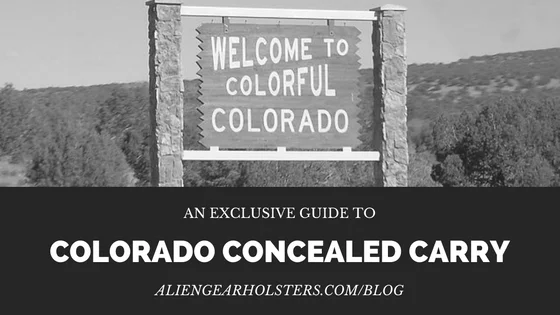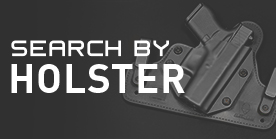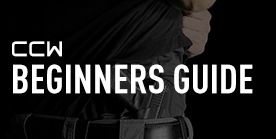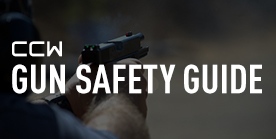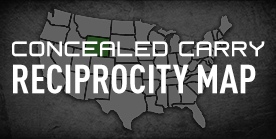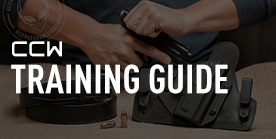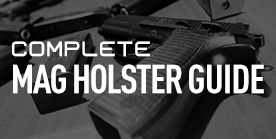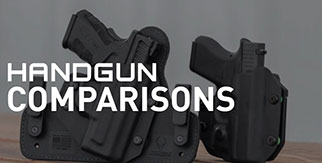The Complete 50 State Guide to Concealed Carry Laws
Concealed Carry Laws in Every US State
(Click on a state to jump to that section)
The first step in concealed carry is knowing how to do so lawfully. Laws vary from state to state, and it is on you to know what the laws are in your state. Concealed carry laws dictate whether a permit is required, how you go about getting one, who can get one, where you can carry and more.
In this guide, we're going to give you a brief overview of every state when it comes to their concealed carry laws. We'll tell you if you need a permit, what you need to do to get it, and a general overview of each state. We also include relevant links to state laws and state agencies for you to learn more.
Bear in mind, this is not legal advice. This is a discussion of publicly available information. We are not responsible for any errors or omissions herein. If you need actual legal advice, please seek out a qualified attorney.
Types Of Concealed Carry Laws

In this guide, you may find three common phrases you are unfamiliar with. To better understand the concealed carry permit process, you should familiarize yourself with these terms and what they mean. Here are a few key terms and their definitions.
States can be grouped into three types: “Shall Issue”, “May Issue” and “Constitutional Carry.” What those terms mean is whether a state requires a permit to carry a gun in public, and the type of law that governs how the permit is issued.
Shall Issue: if the applicant meets the requirements, the state is required to issue the permit. These states typically have the phrase “shall issue" in the concealed carry permit laws, hence the name.
May Issue: the issuing authority can decide to deny the permit application, even if the applicant meets all the requirements; they aren't obligated to grant it. Just like shall-issue, "may issue" states typically use that exact wording in the actual laws.
Constitutional Carry: there is no permit required to carry a concealed firearm, so long as the person is not legally prohibited from possessing one.
“Constitutional Carry” is probably the easiest concept to understand on this list. The idea is the "Second Amendment doesn't mention a permit" and non-prohibited persons, therefore, have every right to carry a gun without needing a permission slip.
At the time of this writing, 25 states have constitutional carry laws. Non-prohibited persons can carry in those states without needing a permit, but can still get a permit if they want to.
Of the remaining 25 states, all but nine are "Shall-Issue." In some shall-issue states, the issuing authority has limited discretion to deny a permit if they have a compelling and demonstrable reason why the applicant shouldn't be allowed to carry a gun.
The may-issue states are CA, CT, DE, HI, MA, MD, NJ, NY, and RI…but may-issue states are currently in a state of flux, due to the Supreme Court's decision in NYS Rifle & Pistol Association v. Bruen.
“Open carry” is another term you will hear referred to regularly in this guide. “Open carry” simply refers to carrying a firearm openly and where visible while in public, rather than concealed upon your person. This guide will discuss what the permit issuing laws are in each state, so you'll know what you're in for.
May Issue States And New York State Rifle And Pistol v. Bruen
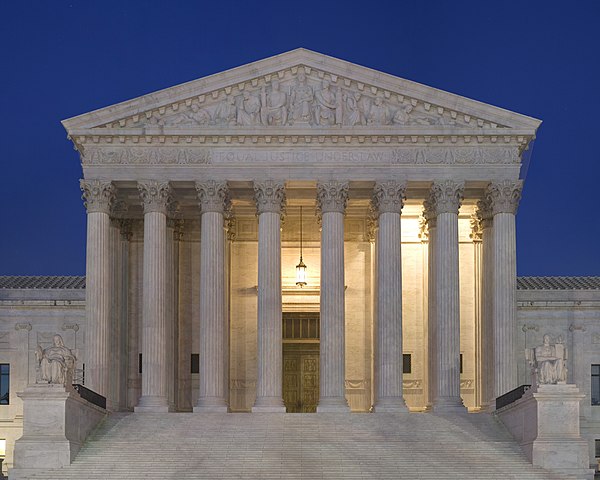
In June of 2022, the Supreme Court of the United States released its decision on New York State Rifle & Pistol Association, Inc. v. Bruen. This case challenged the use of the "good cause" requirement in New York's Sullivan Act, which was the template for may-issue laws nationwide.
The decision held that issuing authorities had to have a real reason to deny an applicant who otherwise met all requirements; giving local authorities total authority on how New Yorkers could exercise their constitutional rights was a bridge too far.
In practical terms, it means that issuing authorities in the may-issue states have to show a good reason (the legal term is "compelling interest") for denying a permit application…meaning they'll have to start granting them.
…but that's not the end of the story.
If you live in one of those states, here are some things you should know about.
In 2015, the Rhode Island Supreme Court ruled in Gadomski v. Tavares that good cause had to be shown for a police chief or sheriff to deny a permit in that state, much like the Bruen decision. Within 18 months, the chief of police for East Providence had been sued twice and ordered both times to comply with the court's order in Tavares and issue permits to applicants.
In other words, he would only approve and issue permits - which he was legally obligated to do - if compelled to by court order. Individual issuing authorities may go rogue in the wake of the ruling, and invite citizens to sue (which is expensive) to get their permits issued.
The states that have had traditionally strict gun control laws are also rushing to pass new legislation restricting where a person can lawfully carry in public. Such legislation was proposed within days of the court's ruling in New York, along with a requirement that applicants turn over their social media accounts to (ostensibly) verify that they were of sound character.
California quickly announced the intention to do more or less the same, along with potentially doubling the length of required instruction needed to obtain the permit. New Jersey has also announced the intention to mirror their response on New York's.
Maryland and Massachusetts seem to be more accommodating, as the Attorneys General of those states issued directives for permits to be approved unless for a compelling reason such as history of violence or drug abuse or prior felonies. Hawaii did likewise.
So while the ruling in Bruen is certainly progress, it doesn't mean people who live in those states are completely out of the woods yet.
Concealed Carry Permit Requirements
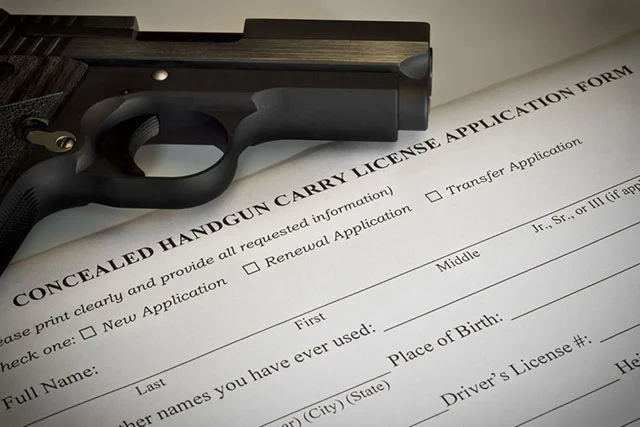
The exact requirements to get a concealed carry permit vary from state to state, but the basics are the same everywhere:
- You must be of legal age (typically 21, but 18 in some states)
- You must be a US citizen, or a legal resident
You must also pass a background check. Anything that would keep you from buying a gun will keep you from being issued a permit. Typically, part of the background check is getting fingerprinted either by law enforcement or through an approved third party.
Most states require you to take a training course and provide proof of same. A few states require a qualification shoot, where you shoot targets at a range for a numerical score. You must make a minimum score to pass; however, the score required typically does not require much expertise and is merely a demonstration of very rudimentary proficiency.
Some states will only issue permits to residents, and some will issue permits to non-residents.
Once you have determined what will be required by your issuing state, you’re ready to get your paperwork together, get fingerprinted, fill out some forms, pay the license fee and wait to get notified.
What About Concealed Carry Reciprocity?

Concealed carry reciprocity means one state honors/recognizes the legality of a permit from another state.
For instance, a person who lives in Spokane, WA might have to drive to Missoula, MT for work or vacation. Since Montana honors permits from the State of Washington, that person would still be legally allowed to carry a concealed firearm while in Montana.
However, a person from Montana with a Montana concealed carry permit cannot concealed carry in Washington, because Washington state doesn't honor Montana's permits. Since reciprocity varies by state, this concealed carry reciprocity map should help you in the event you need to travel between states and have a question about your permit.
People who live in “Constitutional Carry” states may choose to get a permit for the purpose of carrying across state lines. Some will even opt to get a non-resident permit from a different state, in addition to one from their home state, if the non-resident permit has wider reciprocity. If you travel out of state with any frequency, it’s necessary to know what states also recognize your permit.
Some ask why concealed carry permits can't be like driver's licenses.
The quick answer is that each state gets to set its own policy on concealed carry permits; there isn't much federal law or court precedent that governs concealed carry permits or whether states have to recognize or honor permits from other states.
The federal government has not really touched reciprocity at this point, since permit requirements (the Bruen ruling aside) are a public policy issue. This aspect of concealed carry is likely to remain as it is unless something changes.
Concealed Carry in The Car

All states allow transportation of an unloaded firearm in a secure container, but carrying a loaded gun is another matter.
Most states require a loaded gun be concealed and on your person. Some states allow for an openly carried gun to be kept loaded in the car, so long as it's in plain view, but the requirement to conceal the firearm on your person while driving is the most common.
Some states require a permit to have a loaded gun in a vehicle at all, and others have different rules. Make sure you know what your state's laws are, before putting a loaded gun in the car.
When a state has a specific requirement about how to carry in the car, we'll note that in the state guide below. However, you'll still want to be sure to look it up on your own.
As with most aspects of concealed carry, a small change in details makes a big difference in legality. This is the case with interstate transportation. The Firearms Owner Protection Act (FOPA, 1986) provides some protections when transporting a gun across state lines, but none against violating the laws of the state you are in.
FOPA does not protect you against New York's ban on magazines with more than 10 rounds of capacity or New Jersey's ban on hollow point ammunition.
What the FOPA does is allow anyone who lawfully possess a firearm to transport it across state lines, if it is unloaded and kept in a secured container that is not immediately accessible to anyone in the vehicle. FOPA is often referred to as a "peaceable journey" law, meaning that it's legal to travel with a gun, so long as you are peaceably traveling through a place rather than going there armed and looking for trouble.
Some states have additional peaceable journey laws, as well. If traveling across state lines, make sure you look up the laws of every state you will be traveling to.
Duty To Inform: Interacting with Law Enforcement
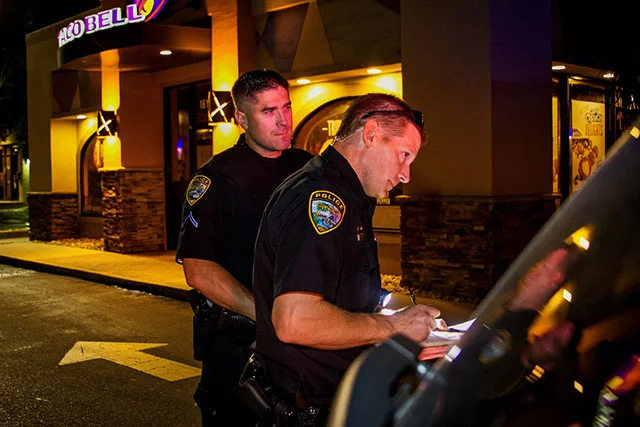
Most states have some regulation on how the lawfully armed citizen must interact with law enforcement.
The most common requirement is to keep your permit on you while carrying and produce it upon request of law enforcement.
Some states include a requirement to declare that you're armed if asked, while others have a "duty to inform" law, which mandates that you must declare to law enforcement that you are armed without being asked. When an officer walks up to your car, or contacts you on the street, you are required to inform them that you are carrying a gun and have a permit.
Some states also specify that law enforcement can disarm you, should they deem it necessary. However, just because your state doesn't specifically state that you must let an officer disarm you doesn't mean they have no authority to, so be aware that it's a possibility.
No Guns Allowed Signs
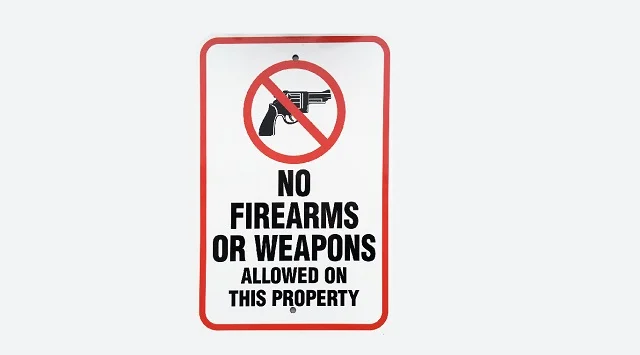
Another thing to be aware of is legally posted signs. Some states give such signage force of law (such as 30.06 and 30.07 signs in Texas), while others do not.
Every state in the union allows for private property owners and operators to forbid possession of weapons on their property. This includes businesses and, of course, private residences. Possession of a firearm where expressly prohibited may be specified as a crime, typically a misdemeanor but in some cases a felony.
However, just because signage doesn't have force of law doesn't mean you can ignore them. Being on private property implies that you agree to do or not do certain things to be welcome there. If you violate that agreement (say by carrying a gun where not welcome), you are trespassing, which you can be charged with if asked to leave and you refuse.
Be aware of what signage laws are in your state, or in any states you visit.
Gun Free Zones: Prohibited Locations
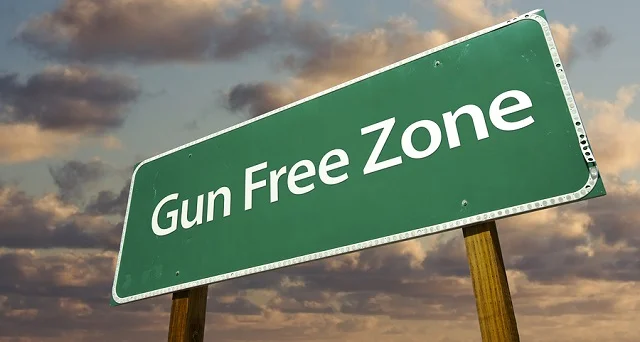
Both the federal and state governments designate certain areas as gun-free zones, in that firearms and other dangerous weapons are prohibited there.
The federal government prohibits the possession of firearms and other dangerous weapons in federal buildings such as offices, post offices and federal prisons, and forbids possession of firearms at schools without a permit.
Regulations regarding schools and government buildings vary by state. Most allow for a lawfully carried gun to be kept in one's car while on school grounds. Others allow you to carry on school grounds but not in buildings, and others still forbid guns on school property whether you have a permit or not.
That may or may not include institutions of higher education, such as colleges, universities or trade schools. Some states allow such institutions to set their own policy, and others don't. Make sure to learn what it is in your state.
Restaurants and bars are also commonly regulated areas. Some states forbid carrying a gun in a bar or tavern but don't in a restaurant that serves alcohol, while others forbid it in any establishment that serves alcohol.
What's most common is forbidding the carrying of a firearm in the licensed area, meaning the actual bar area itself. All states forbid possession of a weapon while under the influence, and most prohibit being served or consuming alcohol while carrying. After all, guns and alcohol don't mix.
Carrying a firearm is generally allowed in national parks or national forests, so long as it is legal for you to carry in the state the national park/forest is in. However, ranger stations and other official facilities are federal buildings, so you'll have to disarm yourself prior to entering.
If you live in a state that has tribal reservations, or travel through them regularly, be aware that tribal land is sovereign territory. Some tribes recognize or honor the permits or constitutional carry law of the state the reservation resides in, and some do not.
As with so many other laws pertaining to the possession of a concealed firearm, know what the tribal law is in the tribal area you are close to and/or traveling through.
It is your responsibility to know what areas are and aren't gun-free zones in your city and state. Again, make sure you understand the laws of your city and state, and those of any state you travel to.
Concealed Carry in Every US State
Alabama Concealed Carry
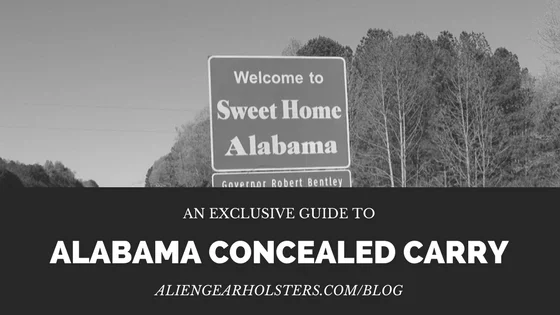

In 2022, Alabama passed legislation removing the permit requirement to carry a pistol in public, making Alabama a constitutional carry state. It takes effect in 2023.
For residents who wish to obtain one, Alabama will still issue permits on a shall-issue basis. Open carry doesn't require a permit, but the gun must be holstered.
To be eligible, you must be 19 years of age, a resident of Alabama, and eligible to possess a firearm per federal and state laws. Alabama doesn't issue non-resident permits, but honors any valid permit issued by another state.
Applications are submitted to the sheriff of your county of residence. The applicant can choose the term of the permit for up to five years.
State law allows law enforcement the ability to deny a permit if the county sheriff has "a reasonable suspicion that the person may use a weapon unlawfully or in such a manner that would endanger the person's self or others." Permits can also be revoked for criminal conduct, with written notice and cause being required.
A person with an Alabama Pistol Permit may carry a loaded gun in the car, if concealed on their person. If you don't have a permit, the gun must be unloaded and stored in a locking container that cannot be accessed by passengers while in the car.
Alabama forbids carrying firearms in certain locations, including courthouses, police stations, jails, and mental health facilities. It's also forbidden to carry near demonstrations, in athletic facilities, schools and athletic facilities hosting school athletic events unless you have a permit.
More information is available by visiting the Alabama Law Enforcement Agency website.
Alaska Concealed Carry
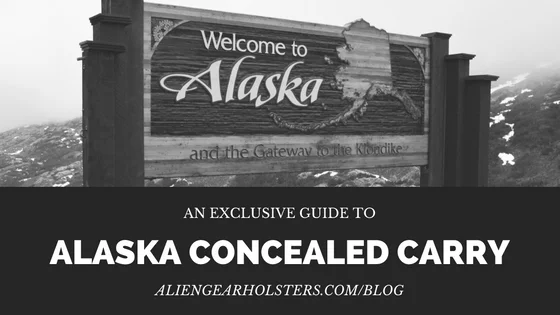

Alaska is a constitutional carry state. Any resident 21 years of age or older can carry openly or concealed without a permit, so long as they are not legally prohibited from possessing a firearm.
The state does, however, offer a permit for those who want one on a shall-issue basis. To be eligible, you must be 21 years of age, legally eligible to possess a firearm, and a resident of Alaska. Alaska does not issue permits to non-residents but does honor any valid permit issued by another state.
Permits are issued through the Alaska Department of Public Safety, and application packets are submitted to the Alaska State Troopers.
To apply, you must submit the application packet with proof of completing a state-approved training course and fingerprints from a state-approved fingerprint service provider. Permits expire five years after the permit holder's closest birthday to the issue date, whether before or after.
Alaska is a duty-to-inform state, so anyone carrying in Alaska must declare to a police officer that they are armed upon contact with law enforcement.
Alaska prohibits carrying weapons at schools, childcare facilities, courthouses and "justice-related agencies," domestic violence and/or sexual assault shelters, and in bars. Carrying in a restaurant that serves alcohol is allowed, but you can't be served alcohol. You are allowed to keep your gun in your car unloaded and in a secure container while in school zones.
Learn more at the Alaska Department of Public Safety.
Arizona Concealed Carry
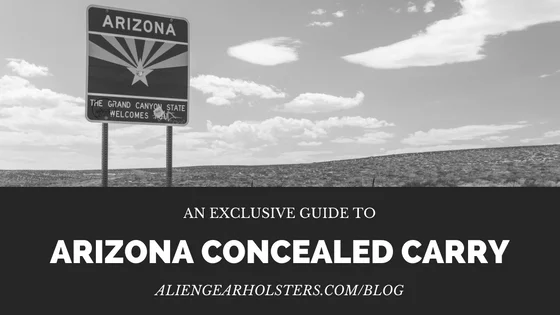

Arizona is a constitutional carry state. Anyone 21 years or older, who isn't prohibited from possessing a gun, can carry openly or concealed without needing a permit, whether they're a resident or not.
Arizona does offer permits on a shall issue basis to both residents and non-residents. Permit requirements are the same for constitutional carry. Those 18 to 21 are eligible, if they are currently serving in or were honorably discharged from the US military.
The issuing authority is the Arizona Department of Public Safety. Applications are mailed to AZ DPS and in addition to the application form, must include two sets of fingerprints and proof of completing an approved in-person training course.
Once issued, the permit is then good for five years.
Arizona generally recognizes any valid permit from other states, so long as the permit holder is 21 or older. Arizona doesn't place many restrictions on where you can carry concealed or openly unless where possession of firearms is prohibited by federal law.
However, state law allows county or municipal by-laws to prohibit where you can carry a deadly weapon, so check local laws.
Arizona is not a duty-to-inform state; you don't have to declare to an officer that you're armed. You are legally obligated to present a permit if asked for one. In addition, much of Arizona is tribal land and almost the entire northeast quarter of the state is home to the Navajo and Hopi tribes. Be sure to check the reciprocity policy of tribes before traveling there.
Read more from the Arizona Department of Public Safety.
Arkansas Concealed Carry
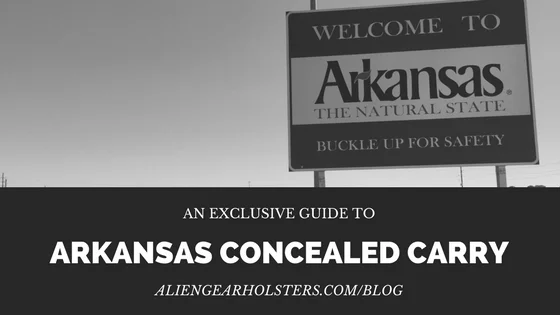

Arkansas is a constitutional carry state, but residents (must be a resident of Arkansas for 90 days) can get a permit if they choose.
Permits are issued on a “shall issue” basis. To carry without a permit or to apply for one, you must be 21 years old, a resident of Arkansas for at least 90 days, and legally eligible to possess a firearm.
Arkansas does not offer non-resident permits except for active-duty military stationed in Arkansas or persons married to someone who is. Arkansas does, however, recognize any valid permit issued to residents of other states.
Arkansas has a tiered license model with a basic or enhanced carry license. Basic permits require a 5-hour training course, while enhanced permits require an 8-hour course.If pursuing a permit for reciprocity purposes outside of Arkansas, opting for the enhanced permit is recommended.
Licenses are issued by the Arkansas State Police, and along with the application packet, you'll need to submit proof of training as well as fingerprints.
Locations where carrying is prohibited in Arkansas includes schools (primary, secondary and colleges), churches/places of worship, most state/municipal buildings, such as courthouses and police stations, bars/restaurants that serve, and athletic events.
However, a person with a concealed carry permit is exempt in some instances, including certain state/municipal buildings (but not courthouses or jails), bars/restaurants, public universities and colleges, and athletic events. Arkansas signage does, however, have force of law; those who violate a sign are guilty of a misdemeanor.
For Arkansas concealed carry laws or permit information, please see more from the Arkansas State Police.
California Concealed Carry
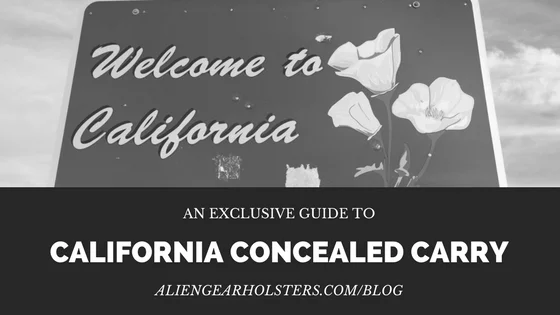

California is one of the may-issue states, and their policies are going to be affected by the Bruen ruling. As of the time of this writing, exactly how it will affect California concealed carry remains to be seen.
California concealed carry requires a permit, which is issued on a may-issue basis. Open carry is illegal except in rural areas or if engaged in lawful outdoor activities like hiking, camping, hunting, fishing or ATV/horseback riding.
You must be 18 years of age and a resident of California. You must not be prohibited from possessing a firearm, pass a background check, get fingerprinted and submit proof of a California-approved training course.
Permits are issued by either the Chief of Police or County Sheriff of the jurisdiction in which you reside or work.
Certain jurisdictions have been either more or less accommodating than others in granting the permit over the years. Sacramento and Fresno were known to be quite accommodating, but San Francisco was famous for never granting a permit. After the Bruen ruling, the chief of police bragged about how he hadn't issued a permit in years. How the ruling will affect these jurisdictions will - again - remain to be seen. Legislation forbidding lawful carry in more public areas is already being fast-tracked.
Once you have your permit, California doesn't impose many restrictions on where you can carry besides schools (primary, secondary or tertiary, public or private), jails, and courthouses. You can't carry on school grounds, license or no, but you can inside a "school zone”. California does, however, allow for permit-less carry in your home, fixed place of business or campsite. California does not issue permits to non-residents and recognizes no permits other than its own.
See more from the California Attorney General's Office and the California Penal Code.
Colorado Concealed Carry
Colorado requires a permit, which is issued on a “shall issue” basis.
Open carry does not require a permit in all of Colorado save Denver, which prohibits open carry. Colorado's concealed carry and other firearm laws post-date many gun laws in the city of Denver, which Colorado residents and visitors should be aware of.
Applicants must be 21 years of age, a resident of Colorado, and eligible to possess a firearm. You also cannot have a conviction for perjury, be subject to a protective order, or be a habitual user of drugs or alcohol.
Colorado does not issue non-resident permits but will issue a permit to members of the armed forces stationed in Colorado and/or their dependents. For non-residents, Colorado honors any resident permit from any state that A) recognizes Colorado permits and B) has equal or more stringent requirements for obtaining the permit.
Prohibited locations include schools (permit holders can store a loaded handgun in a locked car, though) and state or municipal buildings that screen for weapons with metal detectors.
Colorado also has a magazine restriction, in that any magazine with a capacity greater than 15 rounds is illegal unless manufactured/purchased/possessed prior to 2013, when it was enacted.
A loaded handgun may be transported in a vehicle without a permit "while traveling" for a person's protection but cannot be removed from the car if you don't have a permit.
See more from the Colorado State Patrol and the relevant Colorado Revised Statutes.
Connecticut Concealed Carry
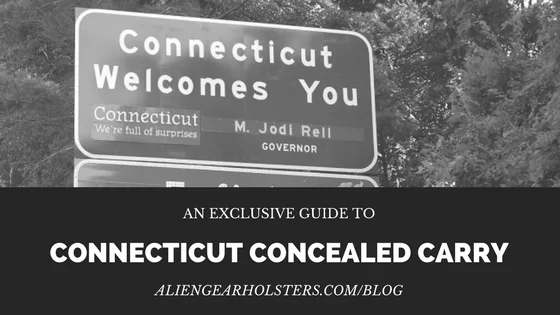

While Connecticut is a may-issue state at law, court precedent from 1963 mandates that permit applications only be denied if the issuing authority can show good cause, making the state closer to "shall-issue" in practice.
It's not likely that the Bruen decision will affect how the state issues permits, but it may at some point.
Concealed and open carry both require a permit. To apply for the permit, you must be 21 years of age, have a business or residence in the jurisdiction in which you are applying, be fingerprinted, pass a background check, and submit proof of training.
During the background check the applicant can be disqualified for a number of convictions which can be seen here. The state has guidelines for approved courses, which must include classroom and live fire instruction.
Connecticut does not honor or recognize any non-resident permits, but anyone holding a valid permit from another state may apply for a Connecticut permit to carry in that state. Applications are submitted through local police or the County Sheriff’s office. If denied, the denial can be appealed to the Board of Firearm Permit Examiners.
Prohibited locations include schools, and any building where legislators meet or legislate. Private property owners can forbid carrying of firearms on their premises and carrying contrary to their wishes is a misdemeanor. Learn more through the Department of Emergency Services.
Delaware Concealed Carry


While may-issue at law, Delaware's practices for issuing permits are generally compliant with Bruen already in that people who meet the requirements typically are granted the permit.
Delaware concealed carry permits require the applicant to be 18 years old, never convicted of a felony or crime of violence, committed to a mental hospital or institution, or convicted of drug offenses.
The applicant must also include 5 references testifying to the applicant's "good moral character” and proof of successful completion of a state-approved training course. Applications are submitted to the County Clerk (known as the County Protonotary) and the applicant must also submit a notice to a local newspaper for publication that they are applying for a concealed carry permit.
The First State does not issue non-resident permits; however, Delaware reciprocates with any state that recognizes a Delaware carry license and that has permit requirements equal to, or greater than, Delaware's. Prohibited locations include schools and school zones unless you are on private property within that zone. It isn't illegal to carry in bars or restaurants but is a felony to possess a loaded gun with a blood alcohol content of 0.08 percent (the legal limit for driving) or more.
Visit the Delaware Attorney General's Office and the Delaware Criminal Code for more information.
Florida Concealed Carry
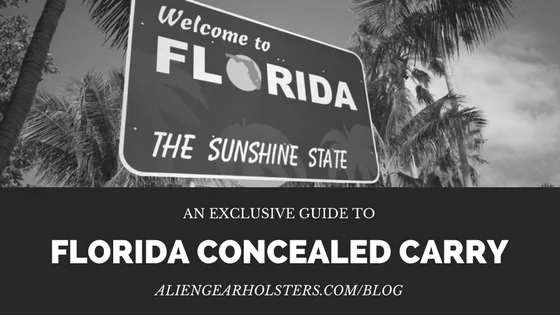

Florida concealed carry requires a permit, which is issued on a “shall issue” basis. Florida issues permits to residents as well as qualifying non-residents. While concealed carry requires a permit, open carry is prohibited except during "outdoor activities" such as fishing or hunting.
Applicants must be 21 years of age or older, legally reside in the U.S and no convictions for violent felonies or misdemeanors. You must also provide proof of completion of a training course, fingerprinting and after passing a background check.
The permit application is submitted to, and issued by, the Florida Department of Agriculture and Consumer Services. The license is good for seven years and you can apply directly to the Department of Agriculture or with the sheriff of your county of residence. For non-residents or visitors, Florida recognizes any valid permit held by a resident of a state that honors Florida's permits so long as the permit holder is at least 21 years of age.
Prohibited locations include state and municipal buildings such as courthouses, correctional facilities, chamber buildings, schools, universities (unless you're a student and have a permit) career centers, polling places and "nuisance locations" where crime happens.
Florida does not give signage force of law. School zones do not prohibit leaving a gun in a locked car before going into a school or other prohibited locations. Florida prohibits carrying in areas of restaurants and other establishments licensed to serve alcohol so you can carry outside the designated bar area, but not the bar area itself. See more from the Florida Department of Agriculture and see more here about Florida concealed carry laws.
Georgia Concealed Carry
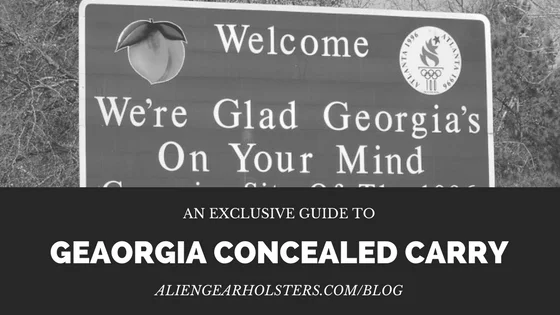

As of April 2022, Georgia is a constitutional carry state. Residents who would be eligible for a Georgia concealed carry permit (21 or older, not prohibited to possess) don't need one to carry in public.
However, Georgia will still issue permits to qualified applicants on a "shall-issue" basis.
To be eligible, you must be a Georgia resident, 21 years or older, and legally allowed to possess a firearm. Applicants 18-20 years old may apply for a permit if they are active-duty or honorably discharged from the military.
Georgia does not offer permits to non-residents, but has amended their reciprocity laws and now recognizes any valid permit from any other state.
Applications are submitted to the local probate court. Those who qualify must submit their application along with proof of completion of an approved training course as part of the application. The court will take your fingerprints on premises or refer you to local law enforcement for fingerprinting.
A Georgia Weapons Carry License is good for five years. Prohibited locations include school zones, unless you have a permit and the gun is kept in your car, government buildings that screen with metal detectors, jails, courthouses, at or within 150 feet of mental health facilities, and at nuclear power plants. It's also forbidden to possess weapons in places of worship, unless the governing body (whatever that might be) allows congregants to carry on the premises. Learn more from the State of Georgia and the Code of Georgia.
Hawaii Concealed Carry
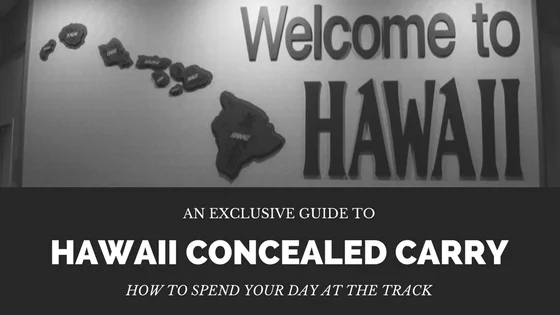

Hawaii will be affected by the Bruen decision. At law, Hawaii is may-issue...but in practice has historically been more like no-issue, which has been the subject of a number of lawsuits.
Concealed carry requires a permit. Open carry is illegal, except for people who obtain and hold an armed security guard permit.
Issuing authorities in Hawaii were known for never finding cause sufficient to grant the permit for concealed carry. For instance, 14 people applied for a concealed carry permit in 2017 through the Honolulu PD and all were denied. In contrast, all 225 people who applied for an open carry permit for use as private security officers were approved. As of that year, Hawaii hadn't issued a concealed carry permit since 2013.
The issuing authority is the chief of your local police department. Permits are good for one year, per Hawaii Revised Statute Section 134-9 and are only valid in the county in which it was issued. Hawaii doesn't recognize permits issued in any other state. In fact, the state requires federal agents in Hawaii on law enforcement business to register their firearms with local law enforcement when they arrive on the island.
Hawaii has been - to this point - one of the strictest gun control states, so the months to come will be interesting to watch.
Idaho Concealed Carry
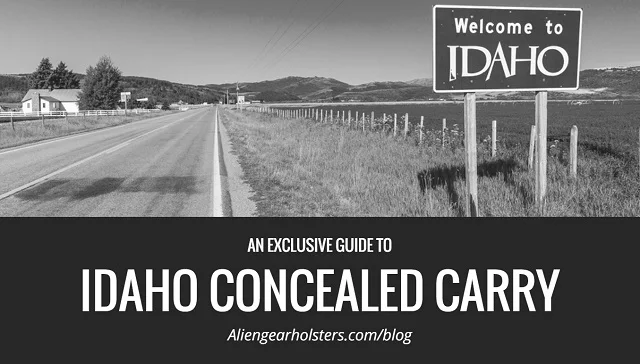

Idaho is a constitutional carry state that also offers basic and enhanced licenses on a “shall issue” basis. Anyone aged 18 or older who is legally allowed to possess a firearm can carry openly or concealed, without a permit, resident or not.
If you want to apply for a permit, you apply through a county sheriff's office. The application must be submitted in person, however, with the requirements being the same to obtain a permit: you must be 18 or older, a resident of Idaho for at least six months, and legally allowed to possess a firearm.
Both permits require classroom and range instruction. The basic permit requires a 4-hour course, the Enhanced permit requires an 8-hour course. Idaho residents should be aware that Washington state (and others) will only recognize the Enhanced permit, so that is the permit to get, if you're getting a permit for reciprocity purposes.
Once issued, the license is good for 5 years.
Prohibited locations include schools, any detention or correctional facilities, and courthouses. Schools provide an exception for those who remain in their car or keep their firearm locked in their vehicle while on school grounds. Colleges and universities set policy for themselves. Make sure you check the rules and regs of the college you're going to attend or visit. Idaho doesn't specify that you can or cannot carry in bars or restaurants that serve, but specifically does prohibit possession of firearms while under the influence.
See more from the State of Idaho and the Idaho Statutes for more information.
Illinois Concealed Carry
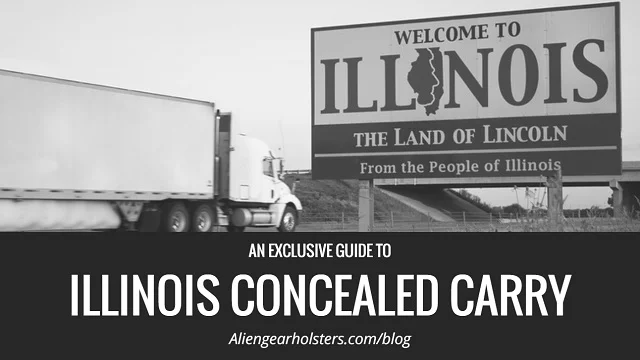

Illinois requires a permit, which is issued on a “shall issue” basis. Open carry is illegal in Illinois, unless you're on private property or engaged in lawful outdoor activities.
To be eligible, you must be 21 years of age and legally eligible to possess firearms.
Illinois does not recognize any other permits from any other state. They will, however, issue permits to non-residents who live in states which have similar laws to Illinois' own, which is limited to Arkansas, Mississippi, Texas, and Virginia. Applicants must first obtain an Illinois Firearms Owner ID card (FOID), which requires a background check.
Once the FOID is obtained, proof of completion of a 16-hour state-approved training course must be submitted with the application. Applications go through the Illinois state police. The ISP can object to an applicant if they have good cause, which will result in the license being subject to review.
Prohibited locations include schools, childcare centers, most government buildings save for areas operated by the Department of Natural Resources, bars, liquor stores, public playgrounds or parks, athletic event centers, amusement parks, hospitals, and nuclear power plants. However, a license holder can possess their otherwise lawfully carried firearm in the parking lot of any of the above-named areas, so license holders can drop their kids off at school, so long as the gun stays in the car. The firearm must be locked in the car if you intend to exit the vehicle.
Illinois gives signage the force of law, so long as the person erecting the sign uses a sign in accordance with state regulations. With that said, you can see more from the Illinois State Police and read the relevant firearm statutes in the Illinois Compiled Statutes for more information.
Indiana Concealed Carry
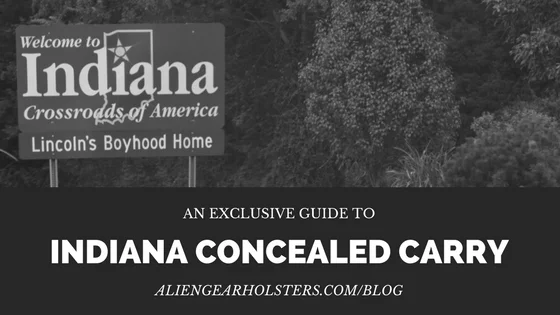

As of July 1, 2022, Indiana is a constitutional carry state. Anyone aged 18 or older who isn't otherwise prohibited from possessing a firearm can carry in public wihtout a permit, resident or not.
Indiana will continue to offer concealed carry permits to qualified applicants, which are issued on a "shall-issue" basis.
You must be at least 18 years old, not prohibited from possessing a firearm, be a “Proper Person” as defined by Indiana Code §35-47-1-7 and a resident of Indiana or a resident of a neighboring state with "regular business in Indiana."
Eligible individuals must submit fingerprints and proof of completing a training course with their permit application. You can choose a license good for 5 years or a lifetime permit. Indiana has eliminated license fees, so the license itself is free. Except for active-duty military members stationed in Indiana, non-residents are not eligible for a lifetime permit. Indiana recognizes any valid permit issued by any other state, so non-residents with a valid out-of-state permit can carry there.
Prohibited locations include schools, on airplanes and controlled areas of airports, shipping ports, certain government buildings, the Indiana state fair, and riverboat casinos. An exception is made if carrying while taking a child or dependent to or from a school function. See more from the Indiana State Police and the Indiana Code, Title 35, Article 47 for more information.
Iowa Concealed Carry
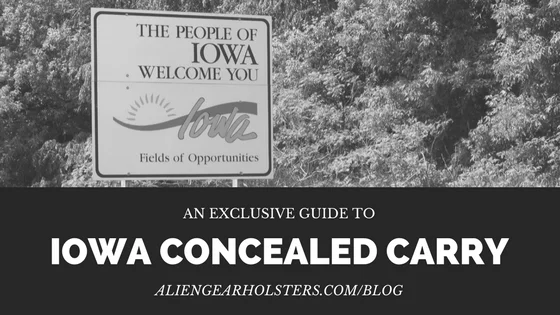

Iowa is a constitutional carry state but offers permits for those who want them on a “shall issue” basis.
To be eligible, you must be legally able to possess a firearm, at least 21 years of age (professional permits, i.e., for armed security positions, may be granted to those 18 years and over) and a resident of Iowa. Proof of completion of a training course is also required.
You must also have no pending charges, felony convictions, outstanding arrest warrants or conviction within three years for an aggravated misdemeanor involving a firearm or explosive. Nonresidents cannot apply for an Iowa license to carry; however, Iowa recognizes a valid permit issued by any other state, so anyone holding a valid permit from elsewhere can carry in Iowa.
Applications in Iowa are submitted to the sheriff of your county of residence.
Prohibited locations in Iowa include schools (public, private, pre-K to 12) school buses, casinos, and the Iowa State Fair. However, you should be aware that Iowa's laws allow municipalities to also forbid carrying weapons in some other locations. It is legal to carry in bars and restaurants that serve, but it is not legal to carry if your blood alcohol content (BAC) is more than 0.08 percent, the legal limit for driving. See more from the Iowa Department of Public Safety and the Iowa Code.
Kansas Concealed Carry
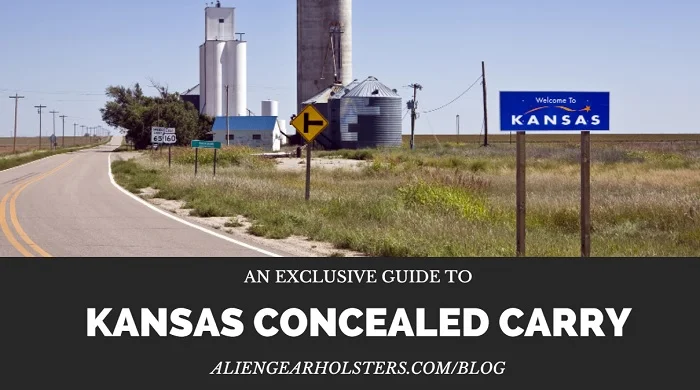

Kansas, like others on this list, is a constitutional carry state, but offers a permit on a “shall issue” basis to those who wish to obtain one. Residents who wish to obtain a permit must be 21 or older and eligible to purchase or possess a firearm.
Kansas does not issue permits to non-residents, unless they're active-duty military stationed in Kansas or their dependents. Kansas recognizes any valid permit held by anyone 21 years of age or older.
The Kansas concealed carry permit application must be submitted with fingerprints and proof of completing a state-approved training course. The application is submitted through your local county sheriff, and once issued, is good for four years. The applicant must be a legal resident of the county in which they are applying and be familiar with the Kansas Personal and Family Protection Act.
Prohibited locations in Kansas include "school districts," meaning school and administration buildings, post-secondary (college) schools, state or municipal mental health or elder care facilities, community mental health centers and "indigent health care clinics." It's legal to carry in the state capitol but be aware that state and municipal buildings can set their own policies, so pay attention to signage. Kansas gives signage force of law, so long as said signage complies with state regulations.
For more information, please visit the Kansas Attorney General's website, and also have a look at the relevant Kansas Statutes regarding concealed carry.
Kentucky Concealed Carry
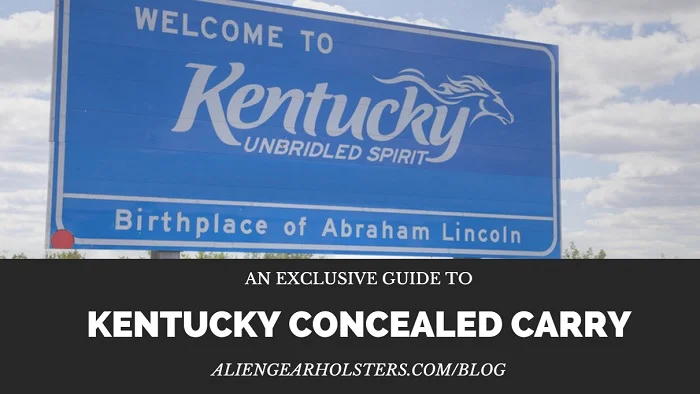

Kentucky is a constitutional carry state but offers permits on a “shall issue” basis. Kentucky's permit-less carry law extends to non-residents and residents, so long as they are 21 years of age, a resident of Kentucky for at least six months, and legally eligible to possess a firearm.
Applicants must also meet several legal criteria such as no convictions for controlled substance possession or use or more than one DUI conviction in the last 3 years, Not owe more than a year’s worth of child support or alimony, and no convictions for 4th degree assault or 3rd degree threats. Kentucky does not issue permits to non-residents, except for active-duty military personnel and their spouses, but does recognize any valid permit issued by another state.
Permits are issued by the Kentucky State Police, and you apply through your county sheriff. Proof of completing a training course is required, including a live-fire portion, and a qualification shoot. Kentucky's qualification requires the shooter to merely hit a silhouette target at 7 yards with 11 of 20 shots, and the license is good for five years.
Prohibited locations include police stations/sheriff's officers, jails and prisons, courthouses, legislative assembly buildings, any section of a business where alcohol is served, into schools or daycares, or controlled sections of airports. Private businesses may prohibit people from possessing weapons on the premises, and can post signage to that effect, but signage doesn't have force of law.
Employers can forbid employees from carrying on the premises but can't forbid employees from storing lawfully carried concealed carry weapons and ammunition in their own vehicles. See more from the Kentucky State Police and the relevant Kentucky statutes for more information.
Louisiana Concealed Carry
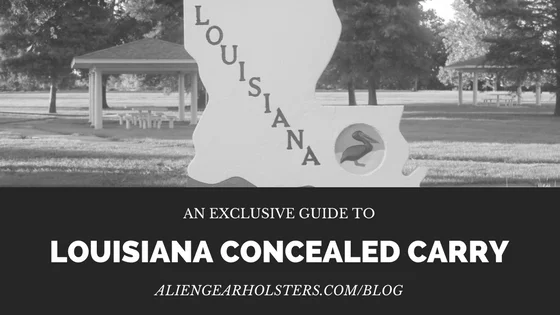

Louisiana has expanded it's concealed carry law partially as of 2022, as military veterans who were honorably discharged or are currently active-duty are not required to obtain a permit or training to carry. Everyone else has to have a permit.
Louisiana is a “shall issue” concealed carry state. A permit is required for concealed carry but not for open carry which can be done at 18 years of age. As with many states, select cities and towns have local laws prohibiting or restricting open carry. Make sure to check local laws before open carrying. To apply for a permit, you must be 21 years of age, legally eligible to possess a firearm, a resident of Louisiana, and a US Citizen. There are several other legal requirements that will be examined during the background check that can be seen here.
Louisiana does not issue non-resident permits but will issue permits to active-duty military personnel who are stationed, or attending school, in Louisiana. You can apply for a 45-day temporary permit in extraneous circumstances, a 5-year permit, or a lifetime permit. For visiting non-residents, Louisiana reciprocates with any state that recognizes theirs.
Applications must be submitted to the Louisiana State Police which can be done online, by mail, or in-person at LSP headquarters in Baton Rouge. Along with the application, you must submit copy of an ID, proof of completion of required training, and two sets of fingerprints.
Louisiana is a duty-to-inform state. If approached by an officer in an official capacity, you must declare that you're carrying and produce your permit. You must also, by law, submit to a “pat down” and allow the officer to disarm you if they decide to.
Prohibited locations in Louisiana include police stations, jails and prisons, courthouses, polling places, meeting places of governing authorities, the state capitol building, controlled portions of airports, churches/places of worship, parades/demonstrations/protests for which there is a permit, the permitted portion of any establishment that sells alcohol, and school zones. Louisiana also forbids possession of firearms with a blood alcohol level of 0.05 or more. Permit holders are allowed to enter school zones, so long as the firearm remains in the vehicle. See the Louisiana Revised Statutes for more information.
Maine Concealed Carry
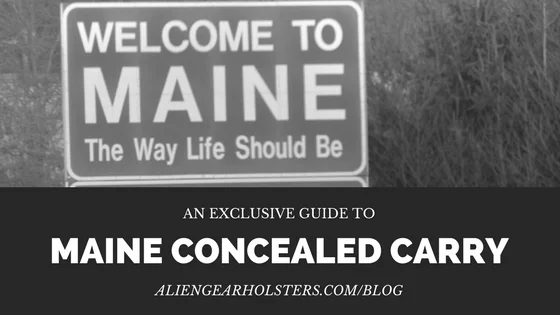

Maine is a constitutional carry state but offers permits on a “shall issue” basis, should residents desire to get one. Maine's constitutional carry law extends to residents and non-residents, so long as they are over 21 years of age, a person of “good moral character” and not legally prohibited from possessing a firearm. Those 18 to 20 years can carry with a permit, which are only issued to those under 21 who are active in, or honorably discharged from, the armed forces.
For those who want to get a permit, you must be 18 years of age, submit proof of an approved training course, and must submit to a background check, including a check of mental health records in the state of Maine. Non-residents can apply but must do so in-person. Maine is a duty-to-inform state. Additionally, you must keep your permit on your person and produce it upon request of law enforcement if you obtain one.
Prohibited locations include courthouses, state parks and certain other state lands, schools, the state capitol, wildlife sanctuaries, and labor disputes. Private property owner/operators can prohibit carry on the premises. Carrying on premises of bars/taverns is allowed if not posted (i.e., no signage), but consumption while carrying is prohibited. A permit is also required for people to leave their concealed carry gun in their car while at work if you want to carry but can't have it on you while working. See more from the Maine State Police and the Maine Revised Statutes for more information.
Maryland Concealed Carry
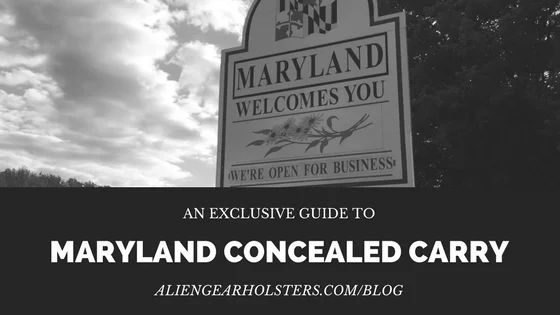

Maryland is one of the most restrictive may-issue states and has long been known to be difficult to obtain a permit in, especially in Baltimore. The Bruen decision is going to change things, but exactly how much...remains to be seen.
Maryland concealed carry requires a permit, which is issued on a “may issue” basis. Open carry likewise requires a permit. You also need a permit to purchase a handgun, which requires a background check and proof of completing a training course. However, you can carry, without a permit, in and around the home or fixed place of business (work) with the permit to purchase.
To apply for a concealed carry permit, you must be 18 years of age, a Maryland resident, and must otherwise not be prohibited from possessing a handgun. Maryland doesn't grant permits to non-residents and recognizes no other permits besides its own.
You must complete a state-approved training course prior to applying and submit fingerprints. The State of Maryland also requires applicants show good cause for why they need a permit. "For personal protection" is usually not enough; you need documentable, substantial threats to your life and safety. Granting the permit is totally at the discretion of the issuing authority, which is local law enforcement. General purpose carry permits (Wear and Carry Permits) may be issued, or you may be issued a limited permit, if deemed warranted.
Prohibited locations include school property, within 1,000 feet of a public demonstration, in legislative buildings, on aircraft or the controlled areas of airports, state-owned buildings or grounds such as parks, Chesapeake Forest Lands, State Forests or Parks, state highway rest areas unless kept in the vehicle, community adult rehabilitation centers, or non-home childcare centers.
Maryland also prohibits the carrying or possession (unless you're in law enforcement) of firearms in any "lodging establishments" where the operator believes anyone possesses anything that might be dangerous to others. Maryland also prohibits any firearms on dredge boats, excepting that up to two (2) 10-gauge shotguns may be kept aboard. You can read more from the Maryland State Police and the Maryland Code for more information.
Massachusetts Concealed Carry
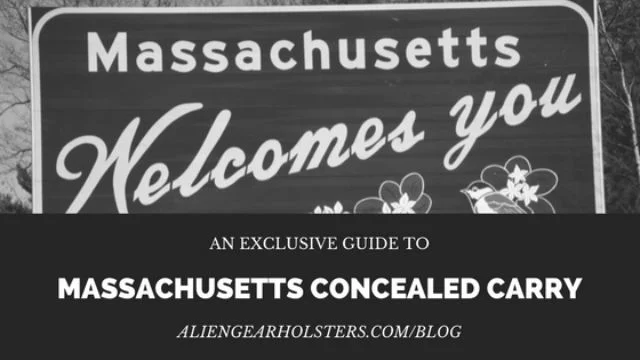

Massachusetts, like other may-issue states, is affected by the Bruen decision. State authorities are already preparing to change their issuing policies, but what this will mean going forward remains to be seen.
Massachusetts concealed carry requires a permit, called a “License to Carry” (LTC), as does open carry. Permits in Massachusetts are issued on a “may issue” basis at the discretion of law enforcement with a requirement to show good cause.
Massachusetts requires you get a Firearms Owner ID (FID) prior to purchase. There are reports of law enforcement requiring people to show cause for those as well.
To get an LTC, you must apply for a Class A license on top of having an FID, which allows you to carry any gun outside the home, openly or concealed. You must be 21 years of age, a citizen or lawful resident of the United States, and cannot otherwise be ineligible to possess firearms. You must also submit proof of completion of an approved training course and any additional documentation as needed.
Applications are submitted through local law enforcement to the Colonel of State Police. Non-residents are also eligible to apply, so long as they meet the requirements. Massachusetts does not recognize permits from other states. Carrying in public requires an unrestricted (Class A) license, but you may be granted a Hunting, Sport, or Work carry permit if denied the unrestricted permit.
If granted a limited permit, it limits how and where you can carry a handgun or transport a long gun. You may be able to carry at work, to and from the shooting range, or carry a long gun for hunting. The permit is valid for 5 to 6 years (it expires on your birthday in the fifth calendar year after the year the permit is granted).
If you are granted an Unrestricted Class A LTC, the only location mentioned by name in Massachusetts law is schools (primary, secondary and tertiary) but be aware that you are responsible for not carrying in any other prohibited locations. Massachusetts is not a duty-to-inform state, but you must have your license on your person and produce it upon request from law enforcement. You can see the Massachusetts state government site or the Massachusetts General Laws for more information.
Michigan Concealed Carry
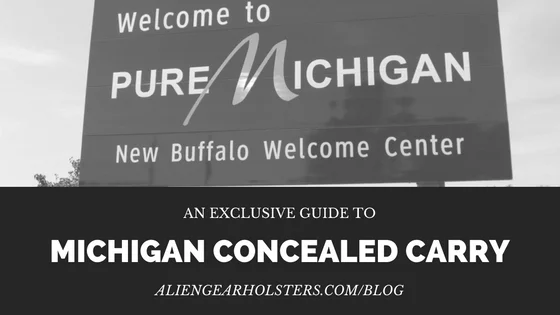

Michigan concealed carry requires a permit, which is issued on a “shall issue” basis. Open carry does not require a permit. To be eligible, one must be at least 21 years of age, registered to vote in and a resident of Michigan (active-duty military stationed in Michigan or nominally residing in Michigan but stationed elsewhere are also eligible) and eligible to possess a firearm. The applicant must also not have been declared mentally incompetent, have been convicted of a violent felony or any specified misdemeanor.
Michigan does not offer non-resident permits, but Michigan recognizes any valid permit issued by the permit holder's state of residence. Your application must include a set of fingerprints from an approved provider and proof of completion of state-required training along with any fees. Applications are submitted to the clerk of the county where you reside. The application must be signed under oath. Once issued, the permit is good for 4 to 5 years, expiring on the permit holder's birthday four calendar years after the permit is issued.
Prohibited locations include schools and school property (unless the gun stays in the car) and daycare facilities, taverns where most of the business income is from alcohol sales, churches, or places of worship unless their policy is to allow firearms, entertainment venues with 2,500 or more seats, hospitals, dormitories or classrooms of universities, casinos, and sports arenas or stadiums (unfortunately, the prohibition of firearms in sports arenas has never prevented the Detroit Lions from shooting themselves in the foot). Michigan also forbids possessing a gun with a BAC of 0.02 percent or more. Learn more from the Michigan State Police and firearms laws of Michigan.
Minnesota Concealed Carry
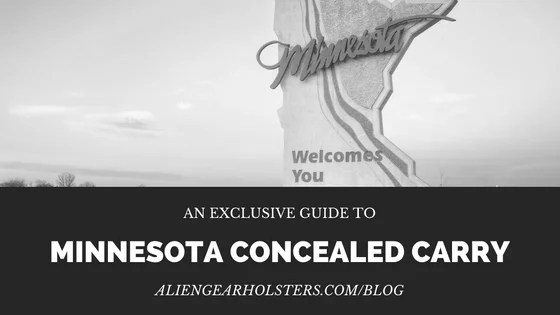

Minnesota concealed carry (and open carry) requires a permit, and they are issued on a “shall issue” basis. To be eligible, you must be 21 years of age, not legally prohibited from possessing a firearm, no convictions for felonies, drug offenses or violent crimes and not have any warrants or active restraining orders. The applicant must also provide proof of completion of an approved training course. Residents must apply through the county sheriff's office in their county of residence.
Minnesota does issue non-resident permits under the same guidelines with the only difference being that non-residents may apply at any County Sheriff’s office. Minnesota also recognizes any valid permit issued by another state. Permits are good for five years from the date it is issued.
Minnesota is not a duty-to-inform state, but the concealed carrier must declare to an officer that they are armed if they are asked and produce their permit upon request. Outside of areas specified by federal law, prohibited locations include jails and prisons, state-operated hospitals, schools and daycare centers, courthouses, and the state capitol. However, you can store a gun in your car on school grounds, so long as the car is locked.
Universities are allowed to set their own policy, so make sure you know what a university's policy is before going there. Private businesses are as well. Signage itself doesn't have force of law, but you can be cited for trespassing if asked to leave and you don't comply. Employers can forbid carrying weapons on company property. Minnesota doesn't forbid carrying in bars or restaurants that serve, but you cannot carry under the influence. See the Minnesota Bureau of Criminal Apprehension and Minnesota Statutes for more information.
Mississippi Concealed Carry
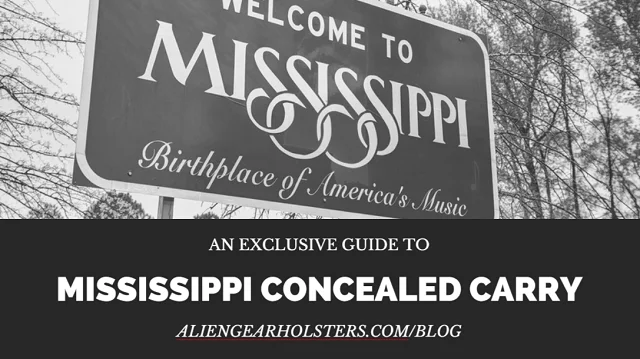

Mississippi in a constitutional carry state so anyone legally able to possess a firearm in Mississippi may carry concealed without a permit. Permit-less carry does have a few restrictions that do not apply to those with a permit. Permits are issued on a “shall issue” basis with a tiered license scheme. Anyone 21 or older (18 for military members), legally eligible to possess a firearm and a Mississippi resident for a minimum of 12 months may apply for a permit.
Mississippi has a tiered system of where you can carry. Those carrying with the enhanced permit have fewer restrictions. Mississippi also recognizes any valid permit for non-residents. Mississippi offers basic and tiered permits on a “shall issue” basis. You must be 21 years of age, a resident of Mississippi, have a valid driver's license and be eligible to possess firearms. Non-residents can apply if they are active-duty military stationed in Mississippi. Those under 21 can apply if they're a member of the armed forces, National Guard or in the reserves.
Permits must be applied for through the Mississippi State Patrol. Included with the application you must provide fingerprints, a color photo and two forms of ID. The basic permit requires completion of an 8-hour basic course, the enhanced permit requires completion of law enforcement and/or combat handgun training which includes a written test, classroom instruction including self-defense law, and a qualification shoot. Permits are good for five years from the issue date.
Prohibited locations include police stations, jails or prisons, courthouses, polling places, legislative (state or local) buildings, schools, colleges or professional athletic events, licensed portions of bars or restaurants that serve or devoted to serving alcohol, colleges of any kind, controlled portions of airports, or in parades or demonstrations that require a permit.
It is also prohibited to possess a firearm in a place of worship, unless said place of worship creates a security program and keeps a list of the members of the security team. Signage can be put up by private business owners prohibiting firearms on the premises but doesn't have force of law beyond the violator being guilty of trespassing.
Enhanced permit holders are only forbidden to carry police stations, prisons and jails, courtrooms, "places of nuisance" e.g., where criminal activity is clearly happening on the premises, and areas forbidden to carry in by federal law. For more information, get more from the Mississippi Drivers Service Bureau.
Missouri Concealed Carry
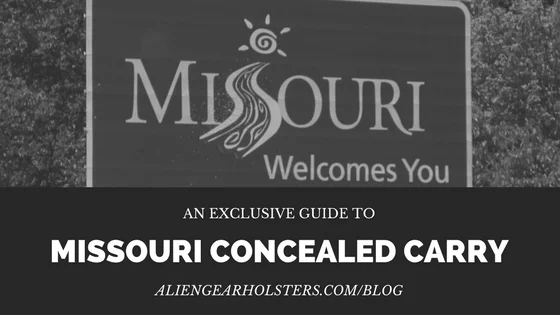

Missouri is a constitutional carry state with a “shall issue” permit system for those who wish to obtain one. Any person over 18 years of age and otherwise eligible to possess a firearm may carry a concealed firearm on their person or wear it openly without a permit, but they can get one if they choose to. Local governments (i.e., city, county) can prohibit open carry where they choose, but having a Missouri concealed carry permit overrides local ordinances on open carry.
To obtain a permit in Missouri, you must be 19 years of age, a US citizen and resident of Missouri, and must otherwise be eligible to possess a firearm. You must attend and submit proof of completion of an approved firearms course, and fingerprints. You must also not be a fugitive, have been convicted of a felony or specified misdemeanor, judged mentally incompetent or have been dishonorably discharged from the military.
Missouri will issue non-resident permits to active-duty military stationed in Missouri, and to their spouses. However, for non-residents and visitors, Missouri recognizes any other validly issued permit. You must apply in-person through local police or county sheriff. Fees are set by the issuing agency but cannot exceed $100 for new permits. The permit is good for five years after being issued. You also have the option for extended permits. You can opt for a 10-year, 25-year, or lifetime permit for an additional cost.
Once granted, there are still some prohibited locations. Some of these include police stations or sheriff's offices, within 25 feet of polling places on election day, prisons or jails, courthouses, government legislative buildings, licensed areas of bars or restaurants that serve alcohol, the controlled areas of airports, hospitals, amusement parks, childcare facilities, riverboat casinos and sports venues with a seating capacity of 5,000 or more.
Possession of a firearm is prohibited at daycare centers and schools at all three levels, but a gun can be possessed or stored in a vehicle on the grounds. Private property owners/operators may post signage, which must be displayed "in a conspicuous place of a minimum size of 11 inches by 14 inches" with 1-inch lettering.
Signage doesn't have force of law, but violators can be cited for trespassing if discovered and refusing to leave. However, getting convicted of trespassing in this manner can result in revocation of the permit if convicted of it more than twice. For more information, see the concealed carry licensing information from the Statutes Of Missouri.
Montana Concealed Carry
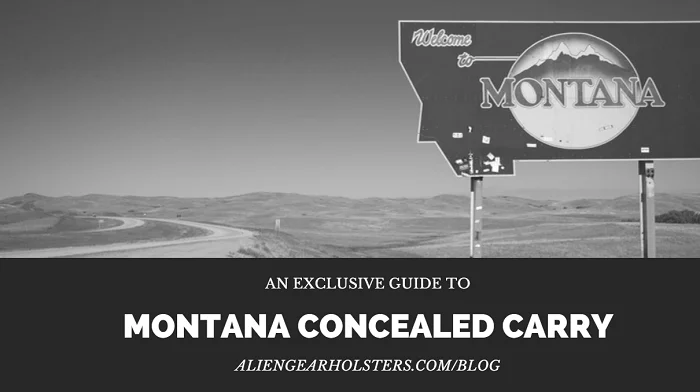

As of this writing, Montana concealed carry has just become permit-less by enacting constitutional carry. For those who want a permit, however, Montana offers permits on a “shall issue” basis. To be eligible, you must be at least 18 years of age, a resident of Montana for a minimum of six months, and otherwise eligible to own or possess a firearm.
Applications must be submitted through the local county sheriff's office, and the permit is good for 4 years. Fingerprinting is required, as is proof of completing a state-approved training course.
Montana does not issue permits to non-residents but does recognize any valid permit issued by another state. Prohibited places include state or local government buildings, in banks or credit unions during business hours, any room where consumption of alcohol beverages takes place in an establishment licensed to sell them, and in school buildings. Montana is not a duty-to-inform state, but you must produce a permit if asked. Get more information from the Montana Code.
Nebraska Concealed Carry
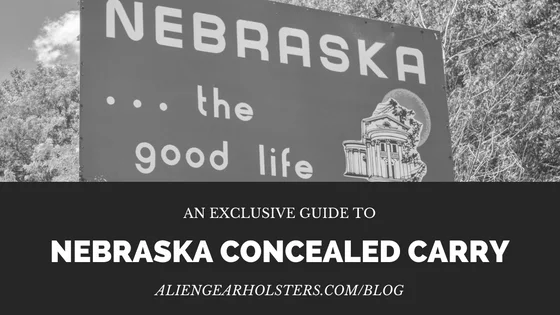

Nebraska concealed carry requires a permit. Open carry does not require a permit at the state level, but certain jurisdictions prohibit open carry for people who don't have a Nebraska permit. Any local restrictions to open carry are nullified if you get a Nebraska concealed handgun permit.
To be eligible, you must be 21 years of age, otherwise eligible to own or possess firearms, and be a resident of Nebraska for at least six months. Nebraska does not issue non-resident permits; however, they will issue a permit to active-duty military personnel stationed in Nebraska and their spouses, even if they maintain a residence in another state.
With that said, anyone who moves to Nebraska can continue to carry so long as they already have a permit from a state whose permits are honored by Nebraska. Nebraska only recognizes permits with similar or more stringent requirements as its own. See the list of approved states from the Nebraska reciprocity page.
Along with the application itself, you must submit fingerprints, proof of completing a state-approved training course, and complete a vision test. This information is then submitted to the Nebraska State Patrol in-person or by mail or online. Training courses must be in-person; no online courses are allowed. Along with any federal gun free zones, prohibited locations include police stations, jails or prisons, courtrooms or courthouses, certain other government buildings, banks and other financial institutions, sports events or venues, hospitals or clinics, primary, secondary, and tertiary schools, daycare centers and places of worship.
Permit holders are also forbidden from carrying in establishments that derive more than 50 percent of their income from the sale of alcoholic beverages. You also cannot consume alcohol if you're carrying a concealed firearm. Houses of worship can designate a security team of their choosing but the security team must all have permits.
Nebraska does, however, specify that guns can be kept in a permit holder's car outside any prohibited location, including schools, so long as they are locked in the truck, glove box or in a car safe. Private property owners/operators can erect signage forbidding possession of weapons, which does not have strict force of law but still must be observed. Employers can forbid carrying on the premises or in company vehicles.
Nebraska is a duty-to-inform state, so you must declare that you're armed to an officer if stopped in your car or otherwise contacted by law enforcement. Your permit must be on you while carrying and produce it upon request by law enforcement. Permit holders are also required to submit to disarming by law enforcement if the officer says they want to or are going to disarm you for the duration of their contact with you. For more information, have a look at permit information from the Nebraska State Patrol and carry laws in the Nebraska Revised Statutes.
Nevada Concealed Carry


Nevada concealed carry requires a permit, which is issued on a “shall issue” basis. Open carry does not require a permit. Nevada issues both resident and non-resident permits. Applications must be submitted to a county sheriff's office, either your county of residence or any county sheriff's office if a non-resident.
Besides persons prohibited under federal or Nevada law from possessing a firearm, you must be 21 years of age, have completed an approved training course and submit proof of it, and a complete set of fingerprints. Nevada will issue a permit to those 18 to 21 years of age for active-duty members of the armed forces, including the reserves and National Guard, or those who have been honorably discharged. The permit is good for five years.
For those who move to Nevada or visit, Nevada honors any valid permit issued by a state that honor's Nevada's; you can see the list from the Nevada Department of Public Safety. If you move to Nevada, residency is established within 60 days.
Once issued a permit, prohibited locations include, airports, schools and daycare centers, or any public building with a metal detector and posted notice that firearms are not allowed. This would include any controlled local, county or state buildings such as courthouses or legislative chambers. Nevada is not a duty to inform state, but you must have your permit on you while carrying and produce the permit if requested by law enforcement. See more from the Nevada Department of Public Safety and the Nevada Revised Statutes.
New Hampshire Concealed Carry
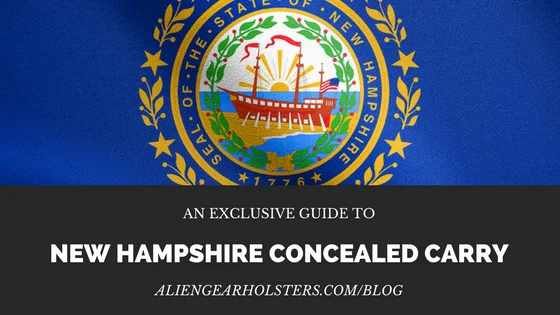

New Hampshire concealed carry is constitutional carry and anyone in New Hampshire, resident or not, can conceal or openly carry a loaded or unloaded firearm without a permit. You can still get a permit, which are issued on a “shall issue” basis, if desired.
New Hampshire does not specify many requirements, outside of not being eligible to possess firearms. The minimum age is 18 to possess a firearm (except in certain circumstances) but a person must be at least 21 to purchase a handgun.
New Hampshire recognizes any valid permit issued by a state that honor's New Hampshire's, provided the permit holder is at least 21 years of age. You can see the list here. Applications are filed through local law enforcement. Fingerprints and photo ID are not required, but you will be required to state a reason for wanting the permit, provide a driver’s license number and three references.
The only prohibited locations mentioned by law are courtrooms or areas used by a court. You can go in the entrance but cannot go past the area controlled by court security. Learn more about permits from the New Hampshire Department of Safety and more about New Hampshire concealed and carry laws from the New Hampshire Statutes.
New Jersey Concealed Carry


New Jersey is one of the may-issue states, and will be affected by the Bruen decision. They have announced their intention to pattern their response on New York's, so residents should pay attention to state and local authorities.
New Jersey concealed carry requires a permit, as does open carry, which are granted on a “may issue” basis. New Jersey doesn't forbid carrying in and around your home or fixed place of business or during outdoor activities such as hunting and fishing. A permit to merely own a handgun is easier to get. To be eligible, the applicant must be 21 years of age, eligible to possess a handgun, and must submit to fingerprinting and provide proof of completing a state-approved training course.
Applicants must give a specific, compelling reason they should be granted the permit, and provide three-character references. The application process itself has two parts. The application is first submitted to the chief of local police, who conducts a background check. After the application is processed by the chief or superintendent of local police, you submit your application to the New Jersey Superior Court. For residents, you go to the Superior Court of your county of residence.
The court then has its own hearings and considers whether you have sufficient cause and/or are of sufficiently good moral character to be issued the permit. The court can deny the permit, or if they deem it warranted, issue a limited permit. Limited permits, as covered under other states with similar laws, can restrict the guns you can carry, where you can carry them and under what conditions you can carry them.
Permits may be granted more often due to the Bruen decision, but new legislation may enact further restrictions on where you can carry and so on.
Residents and non-residents may apply. New Jersey does not honor any other state's permit and is known for being persistent about prosecuting people for driving into New Jersey while still carrying. If you are granted an unrestricted license to carry in New Jersey. The only location specifically forbidden by New Jersey law, outside of areas already designated weapons-free zones by federal law, are schools.
For more information, have a look at the New Jersey Statutes and from the New Jersey State Police.
New Mexico Concealed Carry


New Mexico concealed carry requires a permit, which is issued on a “shall issue” basis. Open carry does not require a permit. Additionally, you can concealed carry an unloaded firearm without a permit or conceal and carry a loaded gun in your vehicle without a permit. However, once the gun is loaded or you step out of your car, you need a permit.
You must apply through the New Mexico Department of Public Safety. Applications can be submitted in-person or by mail. Requirements are that you must be 21 years of age, a resident of New Mexico, and you must complete an approved training course. Proof of taking the training course and fingerprints must be provided with your application. You must not be a fugitive, convicted felon, currently under felony indictment, convicted of specified misdemeanors or have been adjudicated as mentally incompetent.
Active-duty military stationed in New Mexico and their dependents (i.e., spouses) are eligible to apply for a permit. New Mexico recognizes/honors permits from any state that recognizes New Mexico's, so visitors and non-residents establishing residency there can still carry if their permit is honored. You can see the list of permits New Mexico honors and who reciprocates here.
Permits are good for four years from the date of issue, and a refresher course must be taken every two years. Current or retired law enforcement, military and mounted patrol officers are exempt from any fees, however.
The state-required training requires live-fire instruction, instruction in self-defense law and other topics, and the trainee/applicant must demonstrate competence with "a handgun of at least .32 caliber."
Be aware, though, that a lot of New Mexico by territory is tribal land. A New Mexico permit itself does not apply on tribal lands, unless the tribe chooses to honor it. Fully 10% of New Mexico is tribal land, so you need to know what tribes reciprocate with New Mexico permits.
Once the permit is granted, prohibited locations include schools, preschools/childcare centers, courts, and private property where the owner/operator has posted signage. Controlled areas of airports and federally prohibited areas are, of course, included. However, these prohibited locations do not apply to firearms in your vehicle. Permit holders can carry in businesses that sell alcohol that is not for consumption on the premises, or restaurants that derive 60 percent of their receipts from the sale of food that also sell beer, wine or liquor unless prohibited by the owner/operator.
You can read more from the New Mexico Department of Public Safety.
New York Concealed Carry
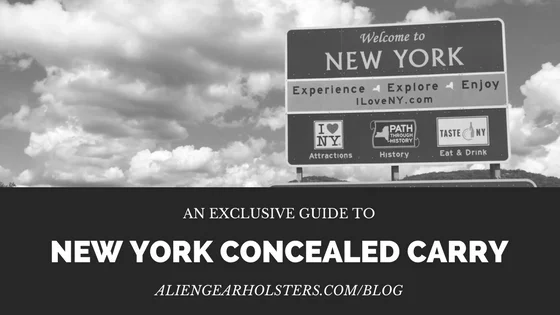

New York was the state in question in Bruen, so how the state and its issuing authorities go about issuing permits is going to be interesting to watch.
New York City has not yet announced what the city's response will be.
Both New York state and New York City require a permit to carry in public, which is issued on a may-issue basis. Open carry is illegal except while hunting, at a shooting range, or in your own home.
To be eligible, you must be 21 years of age and have a residence or regular business in the county in which you are applying for the permit. Those 18 to 21 can apply for a permit if they are a member of, or have been honorably discharged from, the National Guard, Army Reserve, or the regular armed forces.
New York state has several classes of permits, including a permit to carry a gun in and around the home, one for carrying while working in a retail store, one for messengers/couriers, one for judges, one for city/state employees, and an unrestricted carry permit. Along with the application, you must provide a compelling reason why you should be granted the permit, and four references attesting to good moral character. You'll also need to submit two (2) copies of your fingerprints and two forms of ID.
Those residing in the county of Westchester - which includes the cities of Yonkers, White Plains, New Rochelle, Mount Vernon, Peekskill, and Rye - must complete a training course and submit proof. Local police review the application and submit it to either a county court or New York Supreme Court judge for a ruling. The judge will decide whether to grant the permit, and, if applicable, which type.
Permits issued by Nassau, Westchester and Suffolk counties are good for five years. A permit for a gunsmith's license is good for three years. All other permits technically have no expiration, but the permit holder must recertify the permit every five years.
Permits granted elsewhere in New York state are not valid in New York City, nor vice versa. The Big Apple is notoriously unwilling to issue permits to carry for most people. Permits for couriers, retailers and carrying in the home are more common; unrestricted permits have tended to only be issued to the wealthy and/or politically connected.
Anyone with a valid unrestricted permit who travels through New York City must unload their gun, place it in a locking case and put it in the trunk of their car and cannot stop in New York City itself.
The most issued permit is a permit to own and carry a gun in and around the home. However, if granted an unrestricted carry permit, you're only restricted from carrying at schools, school grounds, and in New York City.
New York City is in a rush to designate anywhere and everywhere they can a gun-free zone. So even if you get a New york City permit, they are resolute in trying to keep you from carrying it.
New York state recognizes no permits other than its own; neither does New York City. For more information, have a look at the New York Consolidated Laws.
North Carolina Concealed Carry
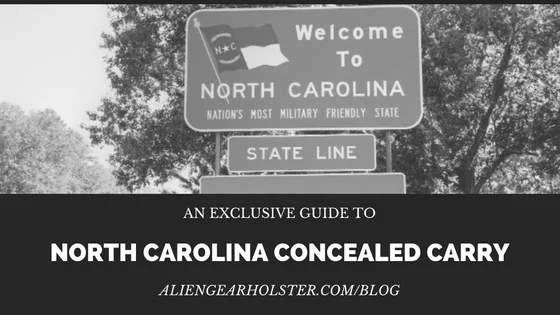

North Carolina concealed carry requires a permit, issued on a “shall issue” basis. You must be 21 years of age, a citizen of the United States, and a resident of North Carolina. New residents can also apply since North Carolina only requires 30 days to establish residency in the state. North Carolina doesn't issue non-resident permits but recognizes valid permits from any other state. Open carry doesn't require a permit, but some cities and towns may have restrictions on open carry.
You must submit fingerprints with your application, along with proof of having completed a state-approved training course. North Carolina training course specifies an 8-hour course, including two hours of legal instruction, basic instruction on firearms handling, operation and storage, and a range portion. The applicant/trainee must pass a written exam with a score of at least 70 percent and must demonstrate proficiency on the range portion by hitting the target with 21 of 30 shots fired. You can see course requirements here. County sheriffs can decide to require a training course for renewals as well, so make sure you look at your county sheriff's policy.
Once issued, the permit is good for five years from the date of issuance. Prohibited locations include schools, courthouses, law enforcement or correctional facilities, state buildings, legislative buildings, and private property where the owner has posted conspicuous signage. You may lock your handgun in your car in the parking lot of any of these named locations.
Carrying in establishments that serve alcohol (i.e., restaurants and bars) is fine, so long as the owner has not posted conspicuous signage. However, you cannot have any alcohol or other controlled substance in your system unless it's a prescription medication. Signage itself doesn't exactly have force of law but carrying on private property where the owner/operator has put up signage is a misdemeanor.
North Carolina is a duty-to-inform state, so you must declare to law enforcement that you're carrying and that you have a permit. You must always have the permit on you and produce it upon request of law enforcement. You can see more from the North Carolina Department of Public Safety and the North Carolina Statutes.
North Dakota Concealed Carry


North Dakota concealed carry is constitutional, so a permit is not required. If you still want a permit, North Dakota issues them on a “shall issue” basis. Open carry, however, does require a permit. To carry without a permit, you must be at least 18 years of age, a resident of North Dakota for at least 1 year, otherwise eligible to possess a firearm, and have a driver's license or state ID on your person.
Non-residents can apply for a permit, but only if they hold a permit from a state that has reciprocity with North Dakota. If you've moved from a state that does not, you'll have to wait until you satisfy the residency requirement. For those moving there or visiting, North Dakota honors permits from any state that recognizes or honors a North Dakota permit. You can see the list of permits North Dakota recognizes here.
North Dakota offers tiered licenses, a Class 1 (enhanced) and a Class 2 license. As with most enhanced licenses, the Class 1 has more training requirements, but will net the permit holder wider reciprocity outside North Dakota. Should you wish to obtain a license, the basic requirements are the same as for constitutional carry. The Class 1 license requires you must be 21 or older complete a required training course, a qualification shoot, and pass a written test (which is open book).
Prohibited locations include designated areas of establishments for sale of alcoholic beverages, gaming sites, public gatherings, schools, athletic events, publicly owned buildings, and places of worship; however, places of worship can allow congregants to carry a firearm if they so choose.
Employers can prohibit possession of firearms on the premises, even by license holders, but cannot prohibit employees from storing a carry gun in their own vehicles in the parking lot. North Dakota is a duty-to-inform state. You must declare to an officer that you are carrying and that you have a permit once they initiate contact. If/when asked, you must produce your permit. Get more information from the North Dakota Century Code and the North Dakota Attorney General's office.
Ohio Concealed Carry
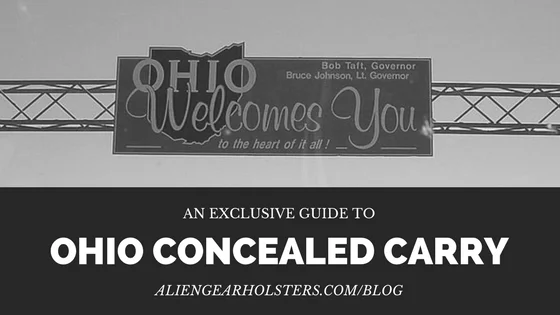

As of 2022, Ohio is a constitutional carry state. Residents and non-residents alike aged 21 and over can carry in public without a permit, so long as they aren't prohibited from possessing a handgun. Those under 21 can carry with a permit, either from Ohio or a valid permit from another state.
However, permits will still be issued to qualified applicants on a "shall-issue" basis. To be eligible, you must be 21 years of age, not otherwise prohibited from possessing a firearm, a resident of Ohio or a non-resident who works in Ohio.
You must submit fingerprints and proof of completion of a training course. Law enforcement and military personnel with documented applicable training can skip the training requirements. The training course must be at least 8 hours in length, at least 2 hours of which must be in-person at a range.
The applicant/trainee must also, during the shooting portion, demonstrate the ability to "shoot a handgun in a safe manner." You must also not be under indictment for, or convicted of, a felony and/or specified misdemeanors.
The application is submitted to a county sheriff's office. Licenses are good for five years after the issue date. Once you have the permit, prohibited locations include law enforcement stations, correctional facilities, airports, mental institutions, courthouses, places of worship, schools, and government buildings.
However, you may possess a handgun in your car at a school if you're dropping off the kids. Universities may set their own policy, so look at the policy of a university if visiting or attending. Places of worship may also set their own policy allowing congregants to carry. Certain government buildings may, by local ordinance, allow concealed carry on the premises.
Carrying in establishments licensed to sell alcohol is permitted, so long as you aren't consuming any alcohol and the establishment in question hasn't put up a sign forbidding firearms on the premises. Ohio is a duty-to-inform state, so you must declare to officers that you are carrying and have a permit. You must always have your permit on you and produce it upon request from law enforcement. For more information, start on the website for the Ohio state government, and Ohio laws.
Oklahoma Concealed Carry
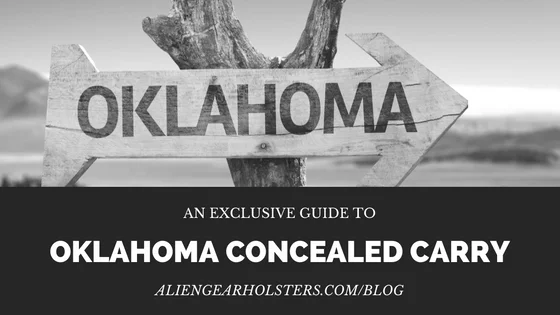

Oklahoma concealed carry is constitutional carry, but you can get a permit if you so desire, which is issued on a “shall issue” basis. To carry without a permit, you must be 21 years of age and not prohibited from possessing a weapon. You can carry openly or concealed, whether a resident of Oklahoma or not. Oklahoma also recognizes any valid permit issued by another state.
To receive a permit you still must be 21 years of age, a citizen of the United States and a resident of Oklahoma. Those 18 to 21 can apply if they are a member or veteran of the military, reserves, or National Guard, or were discharged under honorable circumstances. You must be familiar with the Oklahoma Self Defense Act and not have felony or specified misdemeanor convictions.
You can apply online or by mail through the Oklahoma Bureau of Investigation. You must complete a state-approved training course and submit proof of it. After they've processed the application, the information is forwarded to your local county sheriff's office. They will have you come in for fingerprinting, take your certificate or proof of training and other information, and then submit it back to the OBI for processing. You can choose to pay for a 5-year license or a 10-year license.
Prohibited locations include government buildings, public sports fields, the Oklahoma State Fair, schools, sports arenas during sporting events, or casinos. Business owners/operators can put up signage and forbid patrons and employees from carrying inside their establishment or what have you. However, no business or public entity (including all those listed above) can prohibit securely storing a gun in your own vehicle in the parking lot.
Signage doesn't have force of law, but you can be held liable for trespassing if you are carrying in violation of state law or if discovered and refuse to leave. Oklahoma isn't a duty-to-inform state but does require a permit-holder (or person otherwise lawfully carrying without a permit) to notify if asked and produce it upon request. For more information, have a look at Chapter 53 of the Oklahoma Statutes and the Oklahoma Bureau of Investigation.
Oregon Concealed Carry


Oregon concealed carry requires a permit, which is issued on a “shall issue” basis. Open carry does not require a permit, but state law allows municipalities to regulate open carry. Larger cities in Oregon such as Portland and Salem are typically more restrictive. Applications are submitted through the local county sheriff's office. To be eligible, you must be 21 years of age, a resident of Oregon, not prohibited from possessing firearms or have outstanding warrants, not addicted to controlled substances, out on bail, or a registered sex offender. You also cannot have been convicted within the last 4 years, as a juvenile, for any offenses that, if tried as an adult, would have constituted a felony or misdemeanor.
Residents of bordering states (Idaho, California, Nevada, and Washington) can apply for a license, but those are issued on a “may issue” basis. Oregon does not recognize permits issued by other states. Along with the application, you must submit to fingerprinting and submit a certificate proving that you have completed a state-approved training course or have law enforcement/military training in use of firearms and the license is good for four years from the date it was issued.
Prohibited locations include courthouses, jails and prisons, tribal lands, and casinos, as well as federally prohibited locations like any federal buildings, federal prisons, or controlled areas of airports. Oregon is not a duty-to-inform state, but you are required to present your permit if asked by law enforcement. For more information, have a look at the Oregon Laws.
Pennsylvania Concealed Carry
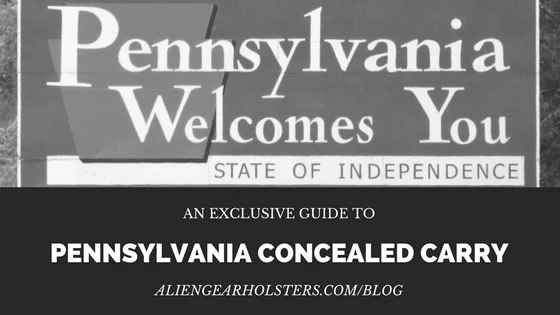

Pennsylvania concealed carry requires a license, which is issued on a “shall issue” basis. Open carry does not require a permit, except in the city of Philadelphia. To be eligible, you must be 21 years of age, have no criminal convictions, be a resident in your county of application for a minimum of 90 days, and not otherwise prohibited from possessing a firearm. You also must be a person of “good character” and not a “habitual drunkard” or addicted to any controlled substance. Pennsylvania does issue licenses to non-residents, but you must already hold a permit from your state of residence.
Pennsylvania recognizes/honors several permits by agreement and by virtue of having permit requirements similar to, or more stringent than, their own. A list of permits that Pennsylvania honors or recognizes is available from the Pennsylvania Attorney General. Applications for permits are submitted through the sheriff of your county of residence or, if a non-resident, through any county sheriff's office.
Once issued, the permit is good for five years. Prohibited locations include courthouses and facilities, casinos, jails, prisons and mental institutions, certain state buildings when posted, private property when posted, Veterans Affairs facilities, and any federally prohibited locations. Schools as prohibited locations are something of an oddity. Pennsylvania law holds that possessing a gun at a school is lawful so long as it's done for a lawful purpose.
However, the Superior Court of Pennsylvania ruled in Commonwealth v. Goslin that the law governing schools allows for school employees or people who possess a weapon for a school-related purpose, so said "lawful purpose" has to do with school activities. Pennsylvania is not a duty-to-inform state, but you must have the permit on you while carrying and produce it upon request from law enforcement.
See more from the Pennsylvania State Police and the Statutes of Pennsylvania.
Rhode Island Concealed Carry


Whether Rohde Island is affected by the Bruen decision remains to be seen.
Rhode Island concealed carry is a little interesting. Rhode Island requires a permit to open or concealed carry, but the system of granting the permit depends on where you apply. In Rhode Island, you can apply for a permit through local law enforcement or through the Rhode Island Attorney General's office. Here's where things take a turn.
At law, Rhode Island is a “may issue” state. For many years, most local law enforcement would just direct applicants to the Attorney General's office, who were/are a bit restrictive about who they issue permits to.
That said, the Rhode Island Supreme Court ruled in 2015 (Gadomski v. Tavares) that local law enforcement must issue the permit if the applicant satisfies the requirements, and further court actions have held that law enforcement can't just direct people to the Attorney General's office if they want to apply for a permit.
Effectively, Rhode Island is “shall issue” if you apply through local law enforcement but “may issue” if you go through the state. However, be aware that just because the state Supreme Court says so doesn’t necessarily mean it will be easier. Some law enforcement officials in Rhode Island are known to resist issuing permits unless by court order.
To be eligible for the permit, you must be 21 years of age and not prohibited from possessing firearms per Rhode Island or federal law. Rhode Island does issue non-resident permits if you are over 21 years of age, can legally possess a firearm, and have a valid concealed carry permit from another state.
The application includes fingerprinting as well as proof of completion of an approved training course. Rhode Island also requires the applicant to demonstrate proficiency in a qualification shoot. The qualification shoot must be with the largest caliber you intend to carry, and you may not carry any larger. Along with the proof of training and qualification, the applicant must include three-character references and a written statement stating the reason they need the permit which is good for four years from the issue date.
Rhode Island does not reciprocate with, nor honor, permits from other states, but will allow possession of a handgun in a person's vehicle if they have a valid permit from another state. In other words, you don't need to disarm if you're just driving through Rhode Island but will have to if you want to get out of the car (then again, Rhode Island is only about 30 miles across, so you won't be driving through it for long).
Prohibited locations include primary and secondary schools and state parks, though some other areas may be prohibited by owner/operators. Of course, federally prohibited locations are still prohibited by federal law. Rhode Island isn't a duty-to-inform state, but you'll have to show law enforcement your permit if they ask. See more from the Rhode Island Attorney General.
South Carolina Concealed Carry


South Carolina concealed carry requires a permit, which is issued on a “shall issue” basis but Open Carry is prohibited in South Carolina. To be eligible, you must be at least 21 years of age, not otherwise prohibited from possessing firearms by South Carolina or federal law, never been convicted of a violent felony, and a resident or qualifying non-resident. South Carolina does not issue non-resident permits unless the non-resident in question owns real estate in South Carolina under the name that will appear on the permit. Proof must be submitted with the application.
For those visiting South Carolina or passing through, South Carolina recognizes or honors any valid permit issued by a state with similar requirements to South Carolina's AND honors South Carolina permits, held by anyone 21 years of age or older. You can see the full list of states that South Carolina reciprocates with here.
You will have to submit two sets of fingerprints, proof of training, and a quality photocopy of your driver's license or state-issued ID. The training course must include instruction in use of deadly force, South Carolina's gun laws, safe storage, prohibited locations, gun and shooting safety, concealed carry, and a range qualification course of fire in the presence of the instructor. Renewals, however, do not have to submit fingerprints or proof of training.
The application is submitted to the South Carolina Law Enforcement Division, meaning the South Carolina state police, and can be done by mail or online. Disabled veterans and retired law enforcement are exempt from fees with documentation of being disabled veterans or retired law enforcement. The permit is good for five years upon being issued.
Once you have the permit, prohibited locations include law enforcement or correctional facilities, courthouses, polling places on election day, offices or meeting places of state or local governments, school or athletic events not related to firearms, daycares and preschools, places of worship, hospitals and any private property with signage declaring that concealed weapons are not allowed. Places of worship can allow carrying concealed weapons if they choose, as can hospitals and other private businesses.
Carrying in prohibited locations is a gross misdemeanor; however, carrying in a location against posted signage is treated as simple trespassing. Signage must conform to South Carolina regulations to be valid. There is no prohibition against carrying in bars or restaurants that serve alcohol, but South Carolina law mandates blood tests for substances in the event of a shooting, including in case of a claim of self-defense. Anyone with a BAC of 0.08 percent or more is presumed to be under the influence.
South Carolina is not a duty-to-inform state but permit holders must always have their permit in their possession while carrying and must produce their permit upon the request of law enforcement. Learn more from the South Carolina State Law Enforcement Division and the South Carolina Code of Laws.
South Dakota Concealed Carry


South Dakota concealed carry is constitutional, so no permit is necessary, but permits are still issued on a “shall issue” basis. South Dakota offers tiered licenses, which are the Gold Card (basic) and Enhanced permits. The Gold Card requires only the application form, fingerprinting, and a background check.
The Enhanced permit requires those things plus an additional training course that covers legal education including use of force laws, live fire training and other subjects. You must also retake the course if you wish to renew your Enhanced permit. The Gold Card gets you reciprocity with 32 states: the Enhanced permit nets 37.
South Dakota's permit-less carry law allows anyone age 18 and over to carry without a permit, so long as they are not prohibited from possessing a gun, whether a resident or not. You must also not be habitually intoxicated, have a history of violence, convicted of a felony or other crime of violence or been declared a danger to themselves or others. South Dakota also recognizes any valid permit from another state. Eligibility is the same; anyone aged 18 or older, whether a resident or not, is eligible so long as they aren't prohibited from possessing a gun by federal or South Dakota law.
Applications are submitted to either the sheriff of your county of residence or to any local sheriff's department if you're a non-resident. Residency is established within 30 days. You can apply in-person or online. Once issued, the license is good for five years from the date of issue.
Prohibited locations include public elementary or secondary schools, any establishment that derives more than 50 percent of its income from the sale of alcoholic beverages, courthouses, game preserve, or the state capitol. See more from the South Dakota Secretary of State and the South Dakota Codified Laws.
Tennessee Concealed Carry
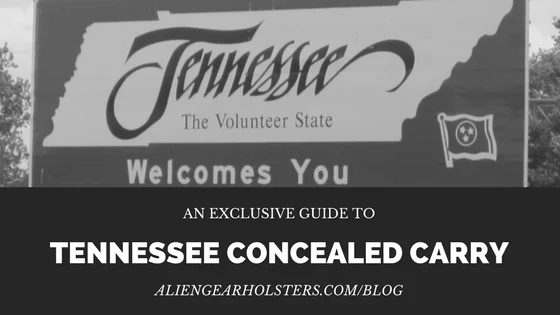

Tennessee concealed carry is permit-less, but you can still get a permit if you want. Permits are issued on a “shall issue” basis. Prior to Tennessee's permit-less carry law, open or concealed carry required a permit. To be eligible, you must be 21 years of age, a resident of Tennessee, and not prohibited from possessing firearms by federal or Tennessee law. You must not have a substance abuse problem, be convicted of stalking and other specified crimes, or have been adjudicated as mentally defective.
Tennessee recognizes/honors any valid permit issued by another state for those visiting Tennessee. If you move to Tennessee, you must obtain a Tennessee concealed carry permit within 6 months. There are two tiers of Tennessee concealed carry permit, the Concealed Carry Handgun Carry Permit, and the Enhanced Handgun Carry Permit. The Concealed Carry Handgun Permit only allows the permit holder to carry concealed; the Enhanced license allows for open or concealed carry. You can get a lifetime Enhanced permit if you choose.
Both permits require a training course. The basic Concealed Carry Handgun Carry Permit requires a 90-minute basic course (with written exam), but the Enhanced permit requires 8 hours of instruction, which includes classroom and live fire portions. You apply for the permit through the Tennessee Highway Patrol, but the permit is issued by the Department of Safety Driver Services.
You make the initial application online with the Tennessee Highway Patrol to get the background check started and complete an approved training course. The next step will be to visit the Tennessee Driver Services office with documentation (proof of training, ID, proof of citizenship) and pay the application fee. Driver's Services will give you instructions on where/how to be fingerprinted and how to submit them. After your fingerprints have been submitted, you wait for approval and for your permit to come in the mail.
Prohibited locations include courthouses, schools, school athletic events and universities, public parks, playgrounds, and other public recreation areas including state forests and greenways. Areas prohibited by federal law remain prohibited; however, those who have an Enhanced Permit gain the ability to possess a firearm at public recreation areas, and on school grounds so long as the weapon remains in the permit holders' vehicle.
Universities set their own policy, so they can elect to allow concealed carry your firearm on campus or not. However, they cannot forbid students from having a gun in their cars. You can carry in bars and restaurants that serve alcohol, but you cannot consume. Tennessee law forbids consumption of alcoholic beverages or other controlled substances (unless prescribed by a physician) while carrying.
Private property and/or business owners/operators can post signage forbidding possession there. Signage must be conspicuous and have the circle and slash over a gun. With that said, a permit holder may store their carry gun out of plain sight in the parking lot. Tennessee is not a duty-to-inform state but permit holders must always have their permit on them and must produce them upon request of law enforcement.
For more information from official sources, more information is available from the Tennessee Department of Safety and the Tennessee Code. Weapons regulations are covered under Title 39, Chapter 17, Part 13.
Texas Concealed Carry
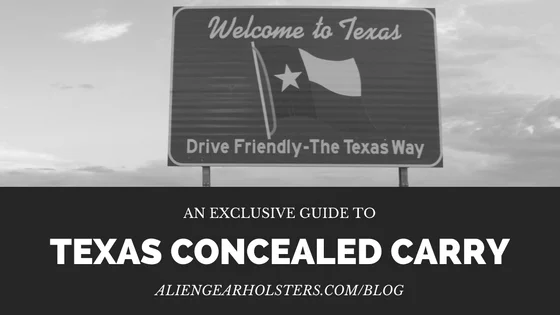

Texas is a constitutional carry state, but still offers permits to willing applicants on a shall-issue basis. The permits are issued by the Texas Department of Public Safety.
To apply for a permit (and carry without a permit) you must be 21 years of age and not prohibited by federal or state law from possessing a firearm. Texas does issue licenses to non-residents as well. Those who move to Texas are legal residents for permit purposes after six months.
The permit application can be denied in case the applicant has been convicted of a felony, is addicted to controlled substances, delinquent in taxes or child support, subject to a restraining order, or if other disqualifiers apply. You can see them here.
If visiting the Lone Star state, Texas reciprocates/recognizes other state's permits by mutual agreement or by gubernatorial order. You can see the list of states whose permits Texas honors here.
Besides the application packet itself, you must submit proof of taking a state-approved training course and two (2) sets of fingerprints.
Texas handgun training courses include classroom instruction as well as a live-fire portion, both of which include examinations. Per the Texas Administrative Code, the applicant must pass a written exam and a shooting course with at least a 70 percent. The trainee/applicant can attempt the exams up to three times in a year.
The Texas shooting qualification is a 50-round course of fire, with 20 shots from 5 yards, 20 shots from 7 yards, and 10 shots from 15 yards at a silhouette-style target. Current or former military personnel, reservists, and people who are in, or have previously served in, the Texas National Guard are exempt from the training requirement. While Texas does have a fee schedule for permits, veterans, correctional and probation officers, former reserve police officers and judges that are retired or currently on the bench receive a discounted rate while active law enforcement and military pay no fees.
The license expires on the birthday of the permit holder after the fourth year of the permit being issued. A renewed permit lasts until your next birthday of the fifth year after the permit is issued. You do not need to take another training course (or qualify) to renew your permit.
Prohibited locations include schools, public sporting events, correctional facilities, within 1,000 feet of a place of execution, courthouses, courtrooms and court office buildings, polling places, racetracks, controlled areas of airports and anywhere federal law prohibits firearms. License holders may, however, have a handgun in their car in and around schools, so you can have the gun in the car for the school run. Public college campuses cannot prohibit concealed carry by statute.
Texas signage has force of law and has very strict guidelines for those signs. Carrying is not permitted in businesses that derive 51 percent or more of their income from the sale of alcohol, such as bars and restaurants. Such businesses must post signage to that effect. Hospitals and nursing homes may also erect this signage as well. You cannot consume while carrying. Having a BAC of 0.08 percent or more is considered prima facie evidence of carrying under the influence; a misdemeanor.
Texas is not a duty-to-inform state, but an LTC holder must keep the license on them while carrying. If law enforcement asks, you must produce the permit. Law enforcement also has the right to disarm you for safety purposes if they deem it necessary for the duration of their contact with you. Those wishing to learn more about Texas Licenses to Carry or Texas carry and gun laws should have a look at the Department of Public Safety and handgun and carry statutes.
Utah Concealed Carry
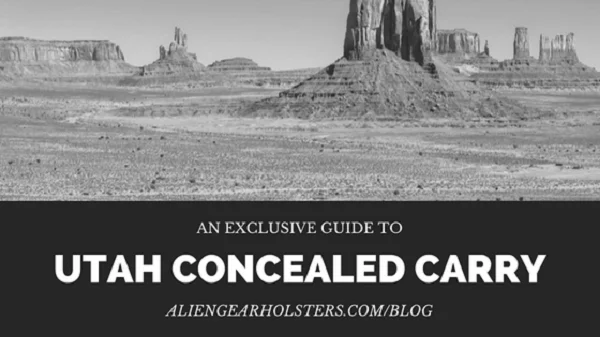

Utah concealed carry is constitutional as of May 2021. All eligible persons can carry without needing a permit, concealed or open. However, you can still get a Utah Concealed Firearms Permit, which is issued on a “shall issue” basis. To be eligible, you must be 21 years of age or older, and not prohibited from possessing a gun by federal or state law. The Utah permit-less carry bill, HB 60 does not specify any rules for residency.
Utah issues permits to both residents and non-residents. Utah is one of the most popular states to get a non-resident permit from for reciprocity purposes. In fact, it's estimated that nearly half of the permits issued by Utah every year are issued to non-residents. Permit applications are submitted through the Bureau of Criminal Investigation either in-person at the state capitol or by mail. You must include the application, proof of completing an approved training course, photocopy of ID, and a fingerprint card. There are no training exceptions; you must complete a Utah-approved training course. However, Utah permit courses are available in most states. Non-residents must also include proof of residency in their home state.
A Utah Concealed Firearm Permit is good for five years. Prohibited locations in Utah for permit holders naturally include federally prohibited locations such as federal buildings, secured areas of airports, correctional and mental health facilities, and secured areas of law enforcement buildings. Places of worship and private businesses can forbid carrying firearms on the premises if they post signage.
Signage at churches and other places of worship have force of law, but only if they register with the state as not allowing firearms on the premises. Carrying in bars and restaurants that serve alcohol is not prohibited but having a BAC above the legal standard for driving (0.05 percent in Utah) is evidence of carrying under the influence, which is a misdemeanor.
Utah is not a duty-to-inform state, but you are required to keep your permit on you (if carrying with one) and produce it upon request from law enforcement. For more information, have a look at the Bureau of Criminal Investigation and the Utah concealed carry laws and rules to get a detailed look at Utah's laws and rules.
Vermont Concealed Carry
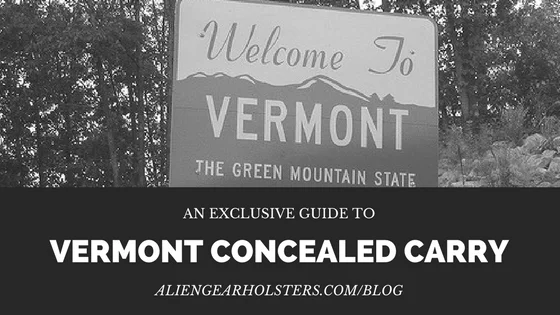

Vermont concealed carry is truly permit-less as the state neither requires nor issues them. Vermont is the original constitutional carry state; carrying in public has never required a permit of any kind regardless of whether you're a resident or not. You must be 21 years of age, a US citizen or legal resident, and aren't prohibited from possessing a handgun. Open or concealed, it doesn't matter.
Prohibited locations include school buses and school buildings, and courthouses. Vermont law also provides that it is illegal to carry a weapon on school grounds with the intent to kill or injure another person. See more in Title 13, Chapter 85 of the Vermont Statutes.
Virginia Concealed Carry


Virginia concealed carry requires a permit, which is issued on a “shall issue” basis. Open carry is generally allowed without a permit, but some jurisdictions in Virginia have restrictions on open carry. Having a permit, however, bypasses those restrictions. You must be 21 years of age, a resident of Virginia, and not otherwise prohibited from possessing a firearm by federal or Virginia law. Active-duty military personnel who normally reside in Virginia but are stationed elsewhere are eligible to apply, as are non-residents.
You apply in-person at the office of the clerk of your county of residence. Along with the application, you must submit proof of completing a training course, and photo ID. After the application process is completed, you'll have to get fingerprinted so the Virginia State Police can begin the background check process. Virginia’s background check process, like many other states on this list, has restrictions based on criminal convictions that will disqualify an applicant such as substance abuse issues, stalking convictions and violent crimes.
The training requirement can be waived for military or law enforcement officers with professional training. After you've been issued a license, you don't need to retake the training course for renewal. Once issued, the permit is good for five years. Certain persons are exempt from the fees including: any law enforcement officers after 15 years of service or at age 55, correctional, probation or parole officers after 15 years of service, or members of the Coast Guard that served as boarding team members or officers for at least 15 years or after reaching 55 years of age.
Virginia does not have a specified period required for residency but does also recognize any valid permit with requirements similar or more stringent than its own. If you're traveling through Virginia, you can see the guidelines here. Unlike other states, Virginia does not maintain a set list of permits of other states whose license they honor or recognize.
Prohibited locations, even for those with a permit, include private property when posted, places of worship, courthouses, school property (unless the gun stays in your vehicle) and the controlled areas of airports. You may, with a permit, concealed carry into any establishment licensed to serve alcohol, but you are prohibited from consumption. Carrying while under the influence of alcohol is a misdemeanor.
Signage does not have force of law per se, but you can be found guilty of trespassing or possessing a weapon in a prohibited location if discovered. Virginia is not a duty-to-inform state, but anyone holding a permit and carrying is required by law to produce the permit upon request from law enforcement. For more information, have a look at the Virginia State Patrol and the Virginia Code Title 18.2, Chapter 7, Articles 6.1 and 7.
Washington Concealed Carry
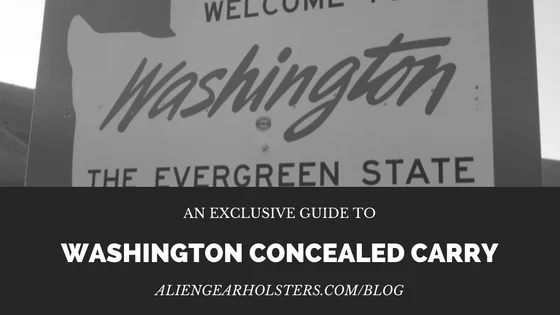

Washington concealed carry requires a permit, but open carry doesn't. Permits are issued on a “shall issue” basis. You must be 21 years of age and not otherwise prohibited from possessing firearms by federal or Washington state law. Residents and non-residents alike may apply for a Washington state Concealed Pistol License. For visitors, Washington state does not honor any other state's permits unless that state’s requirements are the same or greater.
Washington state requires fingerprinting, checks Washington state's mental health database, runs the background check through local law enforcement and the federal NICS database, and doesn't grant permits for those under 21. Since the background check is in greater depth than other states, it limits the permits Washington will recognize. You can see the list of recognized/honored permits from the Washington Attorney General's office.
You apply for the license in-person through either local law enforcement or through the county sheriff's office. Besides the application, you must provide photo ID and be fingerprinted for the background check. The license is good for five years from the date of issue.
Transportation of any loaded handgun in a vehicle, open or concealed, requires a concealed pistol license, so open carriers must unload the gun and place it in a secure case in the car. Prohibited locations include correctional facilities, courthouses, mental health facilities, places designated by the state Liquor and Cannabis Board as off-limits for those under 21, controlled areas of airports, school facilities and events as well as school transportation and childcare facilities. Parents may possess firearms on school grounds if the weapon is kept in the car.
However, Washington state is fast-becoming Far Northern California. While Bruen may have headed a may-issue law off at the pass, prohibited locations are likely to be expanded a la California, New York, etc.
The Liquor/Cannabis rule as written is ambiguous, but what it means is you can't carry in an area that is licensed and/or controlled by the state liquor board. You can't carry in a marijuana shop or the bar area of taverns or restaurants that serve alcohol. Counties and municipalities can also create ordinances prohibiting firearms in certain places, so be aware of them in the town or city you live in or are visiting. For more information, see the Revised Code of Washington, as well as the Washington Department of Licensing.
West Virginia Concealed Carry


West Virginia concealed carry is permit-less, but those who wish to obtain one can still get a concealed carry permit. West Virginia issues permits on a “shall issue” basis for those who wish to get a one. West Virginia offers two permits; a provisional permit for those 18 to 21 years (this permit expires when you turn 21) and an “optional license” which is good for five years for those 21 and over. You must be a resident of West Virginia and not legally prohibited from possessing a gun.
Applications are submitted to the sheriff of your county of residence. Along with the application form you must include valid state-issued photo ID and proof of completion of a training course. Virginia's constitutional carry law extends to residents and non-residents alike. West Virginia also recognizes any valid permit issued by any other state to a person who is 21 years of age or older and isn't otherwise prohibited from possessing a firearm.
Honorably discharged members of the armed forces, and honorably retired law enforcement officers (state or federal) are exempt from fees. Proof of handgun training in the military or law enforcement academy suffice for the training requirement. The training requirement for a provisional license is also satisfied if the application is currently serving, or has previously served, in the U.S. Armed Forces or National Guard with an honorable discharge.
Permit or no permit, there are some prohibited locations in West Virginia. They include school buses, school grounds and buildings, school functions, and courthouses. However, an unloaded gun can be kept in a locked car on school grounds, and a permit holder may lock a loaded gun in their car, so long as it is hidden from view.
Owners, operators, residents, and renters of private property can forbid carrying weapons on the property they own or control. Signage doesn't have force of law, but anyone carrying against the wishes of the property owner/resident/operator is guilty of a misdemeanor (i.e., trespassing) if they refuse to leave. For more information, have a look at Chapter 61, Article 7 of the West Virginia Code.
Wisconsin Concealed Carry
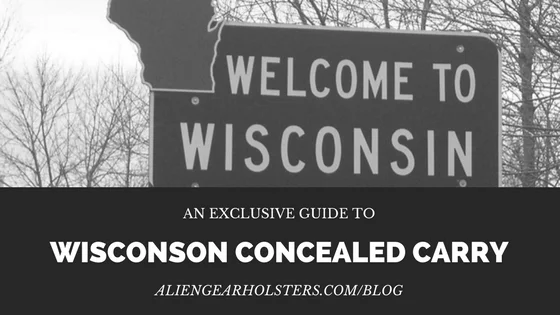

Wisconsin concealed carry requires a permit, which is issued on a “shall issue” basis, while open carry does not require a permit. Those between 18 and 21 years of age can open carry without a permit but are not eligible for a concealed carry permit. To be eligible for a Wisconsin carry permit, you must be 21 years of age and be a resident of Wisconsin or active-duty military stationed in Wisconsin. You must not be prohibited from possessing a firearm per federal or Wisconsin law and must provide proof of training.
Applications are submitted to the Wisconsin Department of Justice. You can apply online or by mail. Basic training courses such as NRA Basic, or state-approved hunter's safety courses qualify. Firearms training given by a law enforcement academy are also accepted. Those who have served in the military and were honorably discharged can submit their DD-214 or DD-256 and/or proof of completing small arms training in the military to satisfy the training requirement.
Wisconsin forbids possession of a weapon in these locations; schools and/or school grounds (public or private, K-12), state or local government buildings that post signage and/or have controlled areas, state wildlife refuges, and in any locations forbidden by federal law.
Those who hold a license can carry concealed in bars or taverns, regardless of what percentage of their receipts are from the sale of alcohol. However, you may not consume any alcohol. Doing so is considered carrying under the influence. Public and private universities set their own policies. Be sure to check with the university you will attend or be visiting.
Signage has quasi force of law in that posted signage must be obeyed, though disregarding it is treated as a misdemeanor (i.e., trespassing) in most cases. Private property owners/operators/renters must erect a sign at least 5 inches by 7 inches and state that carrying weapons on the premises is forbidden.
Wisconsin recognizes most valid permits issued by other states. You can see the full list of permits that Wisconsin recognizes and honors here from the Wisconsin Department of Justice. If you move to Wisconsin, you must apply immediately for a Wisconsin concealed carry permit. It's recommended to start the paperwork before you move. Wisconsin is not a duty to inform state, but they do require you keep your permit on you and produce it upon request from law enforcement. For more information, have a look at the Wisconsin Department of Justice and the Wisconsin Law Library.
Wyoming Concealed Carry
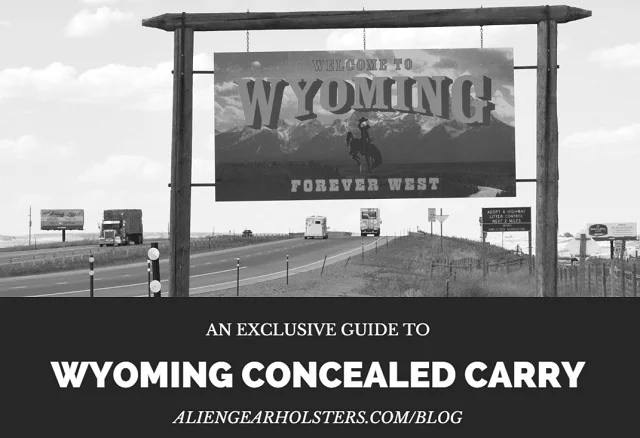

Wyoming is a constitutional carry state, but you can get a concealed carry permit if you desire. Wyoming carry permits are issued on a “shall issue” basis, with very similar requirements and procedures to other “shall issue” states.
Wyoming's constitutional carry law covers both residents and non-residents, so no permit is required so long as you are of legal age (21 or over) and are legally able to possess a firearm. While no permit is needed, Wyoming recognizes any valid permit issued by another state if it is valid throughout that state and that state recognizes Wyoming's permit, however; there are some eligibility requirements.
To carry in Wyoming, you must be 21 years of age and a US citizen or lawful resident and must not be prohibited from possessing a firearm. You may carry when you are between 18-21 years old with a permit which is issued on a “may issue” basis. Wyoming doesn't issue permits to non-residents, and anyone who moves to Wyoming must reside in the state for at least six (6) months to establish residency. Applications are completed through the sheriff's office of your county of residence. Along with the application packet, you'll need to submit proof of completing a training course, photo ID, and your fingerprints will be taken. If you retired from law enforcement (honorably) after at least 10 years of service, that also satisfies the training requirements.
The county sheriff has discretion to deny the permit but must have a compelling reason to do so. County sheriffs have 60 days to complete the background check and issue the permit. If they haven't found a reason to deny the permit in that time, the permit must be issued. Once issued, the permit is good for five (5) years from the date it was issued on.
Prohibited locations include law enforcement buildings such as police stations, jails or prisons, courtrooms (unless you're a judge), meetings and meeting places for the state legislature or local government, schools, colleges and universities, professional athletic events not related to firearms, and any portion of an establishment licensed to serve alcohol. Naturally, anywhere firearms are prohibited by federal law remain prohibited.
Wyoming is, of course, home to Yellowstone National Park. It's legal to carry in national parks, except for federal buildings, so long as it's legal for you to carry in the state the national park is located in. Wyoming is home of the Wind River reservation, one of the largest Native American reservations in the country. However, the Wind River Tribal Court allows concealed carry with a permit, so you will need one to carry on their tribal lands. For more information, check out the Wyoming Division of Criminal Investigation.
Washington D.C. Concealed Carry
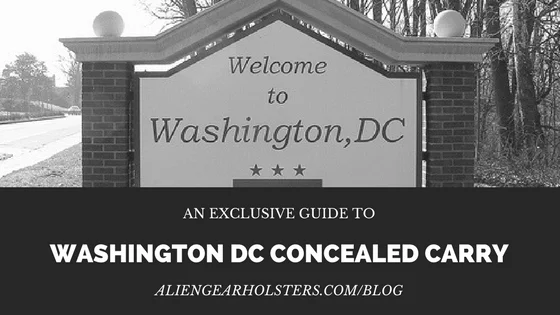
Washington D.C. concealed carry requires a permit, which is issued on a “shall issue” basis through the Metropolitan Police Department. Open carry is prohibited with or without a permit. You must register your handgun and take an online training course before applying for the concealed carry permit.
To apply for the permit, you must be 21 years of age (18-20 with parent or guardian approval), eligible to possess a firearm, cannot be legally blind (they're one of the few jurisdictions to specify this) and reside in or have a fixed place of business in Washington D.C. You must also to complete the requisite training course.
While the basic training course is offered freely by the DC Metro PD, the concealed carry permit requires taking a training course from a qualified instructor from the DC Metro PD's list of approved instructors. Washington DC does not recognize any concealed carry permits from any other jurisdiction. However, non-residents who work in Washington D.C. can apply for a non-resident permit if they already hold a valid permit from another state.
For the application, you must submit two forms of ID, including at least one photo ID. You must also submit proof of completing the required training course, and you will be required to be fingerprinted. You may also get preliminary approval without training, provided you attend an approved course within 45 days.
The Chief of the Metropolitan Police can decide whether to exempt a person from the training requirement or not. Those with law enforcement experience or military training may be exempt, but these exemptions are granted on a case-by-case basis. Once issued, the license is valid for two (2) years. Renewal fees are the same as the license fees.
Prohibited locations include city government buildings, the building and grounds of any childcare facility, preschool, public or private schools and universities, mental health hospitals or offices, correctional facilities, voting places during voting, on public transportation, on premises licensed to serve alcohol, stadiums or arenas, and during demonstrations, parades or "special events" where the organizer publicizes firearms are prohibited.
Firearms are prohibited at public memorials at the National Mall, around the White House, around the Naval Observatory, within 1,000 feet of a dignitary or official under protection by the DC Metro PD, or within 1,000 feet of any demonstration in a public place. Firearms are prohibited in places of worship, unless said place of worship allows them. Firearms may also be prohibited by owners/occupiers of residences, and non-residential property (i.e. businesses) if they post conspicuous signage. For more information, you can learn more from the Metropolitan Police Department.
Concealed Carry in US Territories
For those unaware, US territories belong to the United States but obviously are not states. Essentially, they're colonies. They belong to us, but aren't full members of the club.
There are five inhabited US territories - American Samoa, Guam, the Northern Mariana Islands, Puerto Rico and the US Virgin Islands - and eight uninhabited territories, the US Minor Outlying Islands. All five inhabited territories are unincorporated, meaning they belong to the United States but aren't shortlisted for annexation, meaning they aren't on a path to statehood. There's a long and complicated history to that, but that is a separate issue for another time.
What does this mean as far as the Bruen decision is concerned? That's a great question, because the answer is nobody knows.
With that said, here's how concealed carry works in the five US territories.
American Samoa Concealed Carry

Concealed carry is illegal in American Samoa.
You can open carry if you have a license to possess a firearm, but they aren't usually issued for handguns. Gun ownership is mostly restricted to shotguns and rimfire rifles for hunting purposes, so it's rare for anyone besides police to have a handgun, let alone carry one.
Guam Concealed Carry

Guam concealed carry requires a permit, which is issued on a “shall issue” basis. Guam's firearms laws are similar to US states like Illinois and others in that a Firearms Owner ID is required to purchase, and then you have to get a permit to conceal. Open carry is permitted for anyone with a FOID.
To be eligible, the applicant must be 21 years of age, a resident of Guam and/or a US citizen, not prohibited from possessing a firearm under US or Guam law, have a valid FOID, and have completed a training course. Acceptable training courses include hunter's safety and basic firearms courses such as NRA basic courses. Training received for employment as a law enforcement officer, or a member of the military will suffice for the training requirement.
Applications are submitted to the Guam Police Department. Along with the application, the appropriate ID (standard photo ID/driver's license plus your FOID) and proof of training, you will have to be fingerprinted. The license is good for three years from the date of issue. Qualified police officers and qualified retired police officers are exempt from the fees.
Prohibited locations include jails, prisons, courthouses (unless you're a judge carrying in chambers), the Guam legislature, private property and/or businesses that post signage, anywhere forbidden by federal law, or in schools. Guam does not reciprocate with, nor honor permits from the United States, but people who move to Guam are eligible to apply for the permit within 30 days.
More information can be found in Chapter 60 of Guam's Public Laws, and from the Guam Police Department.
Northern Mariana Islands Concealed Carry

Concealed carry in the Northern Mariana Islands is illegal, and a permit is required to purchase guns and/or ammunition. Those who lawfully own can open carry without a permit in certain areas. If you have a valid permit to own a firearm, and wish to carry your handgun openly, the following are prohibited locations per the laws of the Northern Mariana Islands:
Government buildings and their parking lots and Department of Public Safety buildings. Firearms are not allowed within 500 feet of the following places: polling places on election day, daycare facilities, detention centers or jails, courthouses, courtrooms, court office and libraries, any building owned or operated by domestic violence shelters, any building holding a public meeting, places of worship, and casinos or establishments with legal gambling.
Firearms are also not allowed within 1,000 feet of schools. Firearms are also prohibited in hospitals - unless kept in a vehicle in the parking lot - and are prohibited in any establishment that serves alcohol. Places of worship can, however, decide to allow firearms on the premises if they so choose. Private residences and businesses may forbid possession of firearms on the premises if they choose and must post signage. Said signage must be 11 by 14 inches, with 1-inch (or larger) lettering.
Possession of firearms in prohibited areas is a felony. Private property owners may also sue for "injunctive relief" if someone carries a firearm on their property without permission, including damages "not less than $10,000."
Puerto Rico Concealed Carry

Puerto Rico concealed carry requires a permit, which is issued on a “shall issue” basis. Open carry is not allowed except for police or armed guards. A permit is required to purchase and own, but the permit to purchase/permit to own is also the permit to carry. You must be 21 years of age, a US citizen or resident of Puerto Rico, have a negative criminal record certificate issued within 30 days of the application, and cannot be prohibited from possessing a gun.
The applicant must submit three-character references attesting that the applicant isn't a violent person or otherwise don't object to the person having a gun. They must not be blood relatives or a spouse. The Child Support Administration must also certify that the applicant has no outstanding child support debt. Training is required, along with a statement from an official of a gun club attesting that the applicant has passed a course demonstrating competence in handling firearms.
Those who possess a license will want to keep it current due to the fact that once you obtain a license, you will incur a $100 fee per month that you don't renew it after it expires. If you don't renew the license within six months, your guns will be seized as you no longer have a valid permit to own firearms. Puerto Rico also reciprocates with all valid permits issued in the rest of the United States.
However, since you are technically entering a quasi-foreign country, you must register the firearm and any ammunition with the Puerto Rican government prior to traveling there. So, you could take your gun to Puerto Rico, but it's a bit of a hassle. Prohibited locations include schools and universities, government/public buildings, mental institutions, and anywhere prohibited by federal law. It is also illegal to carry on election days.
For more information, see the laws of Puerto Rico.
US Virgin Islands Concealed Carry

Concealed carry in the US Virgin Islands requires a permit, which is issued on a “may issue” basis. Like “may issue” states, the applicant must show cause why they should be issued one. The applicant may be issued a limited-use permit, allowing the bearer to purchase and carry a gun at work or around the home for personal protection. Carry permits are understood to be very rarely granted to the public.
Whether the Bruen decision even applies in the US Virgin Islands is a sticky wicket. On the one hand, it would certainly apply to any and every US state. However, it's also the case that the Constitution doesn't fully apply in the territories since they aren't states. That begs the question of what does and that is a question that no one knows the answer to.
To be issued any gun permit, you must be a resident of the US Virgin Islands, must not be a minor, and cannot be prohibited from possessing a firearm. Applicants must also demonstrate that they are "a person of good moral character." For people who are government employees, in the business of making, repairing, or dealing in guns, or getting a gun for hunting, the US Virgin Islands have specific licenses for those purposes. For all others, you must have a bona fide residence or place of business in the Virgin Islands and demonstrate a good reason to fear death or great injury.
You must also have at least two witnesses that provide written statements backing up your claim of an immediate need to have a license to carry a gun. Applications are made through the Virgin Island Police Department. You must apply in-person in St. Croix, or St. Thomas/St. John. The issuing authority is the Police Commissioner.
When you apply, you must be fingerprinted, provide proof of completion of a training course, and statements from witnesses attesting to your need to carry a gun. Proof of military service and/or training as part of your military service can suffice for the training requirement.
After the license application and all paperwork is submitted, the Commissioner has 45 days to conduct the background check and decide on whether to issue the permit. If your permit application is denied, you will get a reason in writing as to why it was. There is an appeals process in case you wish to appeal a denial.
If you're granted a restricted permit, you can only carry the gun in exactly the manner described on the license. Your license can be revoked or suspended if not. Suspension of your license will also mean forfeiture of your firearms; you need a license to purchase as well as carry.
The US Virgin Islands also recognizes valid permits issued to non-residents, so you technically can carry in the US Virgin Islands if you're visiting. Residents of the US Virgin Islands, however, cannot obtain a non-resident permit to circumvent permit requirements.
With that said, you must declare and register any firearms upon arriving in the US Virgin Islands. Firearms declaration areas are in the baggage claims area of airports, so you don't have any excuse for not doing so. Get more information from the Firearms Bureau of the Virgin Islands PD and Title 23, Chapter 5 of the US Virgin Islands Code.
Know Your State's Concealed Carry Laws

Reading the information for your state in this guide is just the beginning. The information presented here is only meant to get you started. We've included links to official sources to enable you to confirm the information presented and allow you to have the most accurate and up-to-date information available in your area.
Remember, this guide is not meant to be taken as legal advice, and we cannot be held liable for any omissions or errors contained herein. It is up to you to make sure that you are carrying in compliance with all relevant state and local laws.
Hopefully, you've gotten a good basic idea of what concealed carry is like for your state, and therefore how to get started but remember also that getting the permit isn't the end of this journey to being a competent, safe, and legal concealed carrier; it is just the beginning.
Always remember, a concealed carry permit isn't a badge. It's a license to carry a lethal weapon concealed upon your person at all times. The safety and security you gain from having a concealed firearm on you at all times depends mainly on your level of training and mental attitude. It takes a lot of practice to master.
Taking an 8-hour training course is just the beginning of getting training in gun safety, shooting and marksmanship, in the letter and spirit of the laws of self-defense. It's up to you to continue your education in all those areas.


